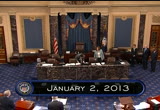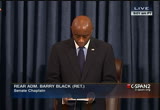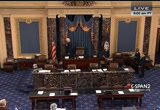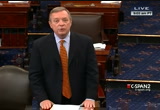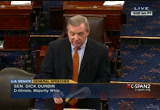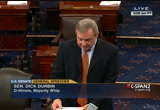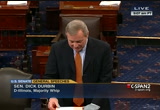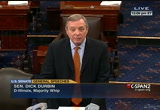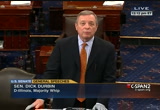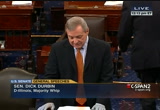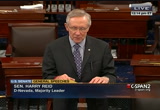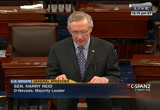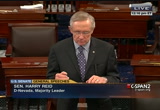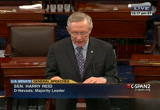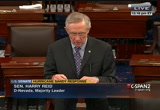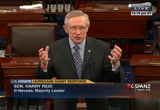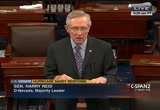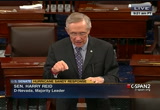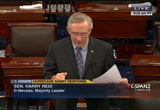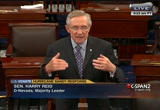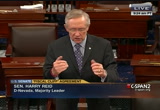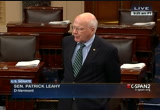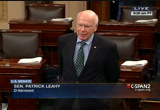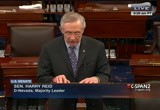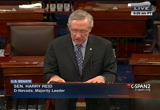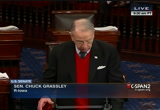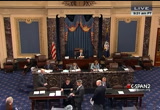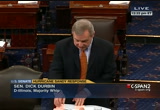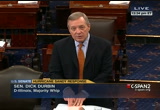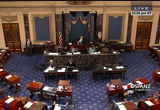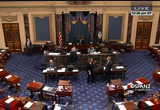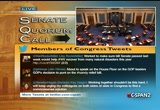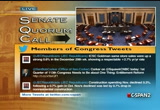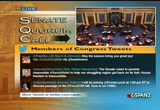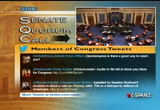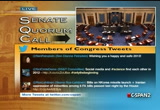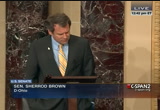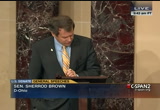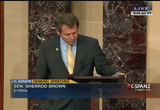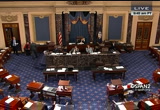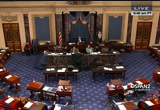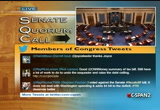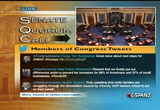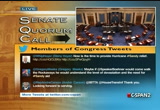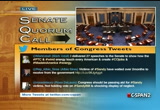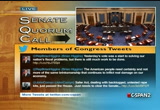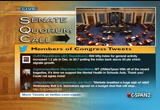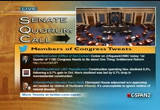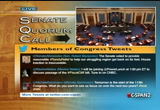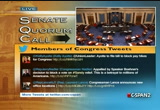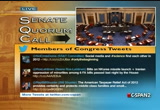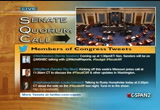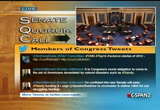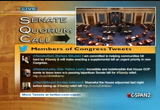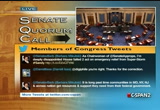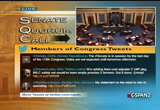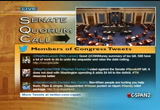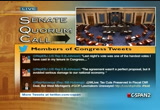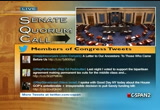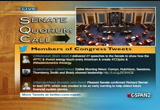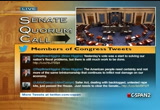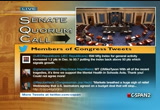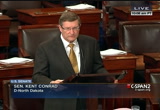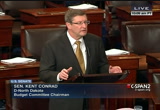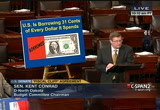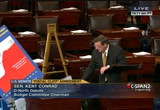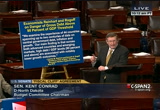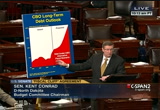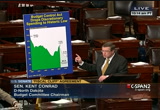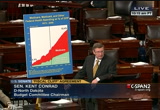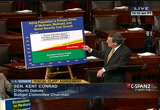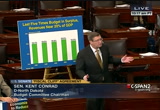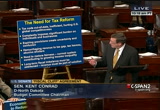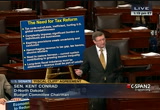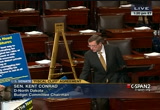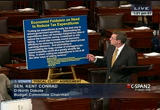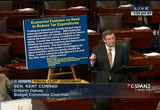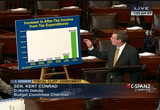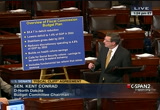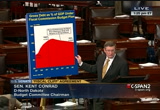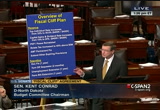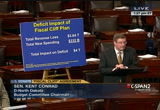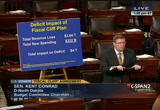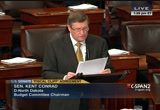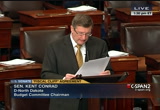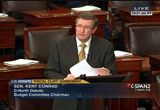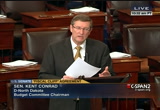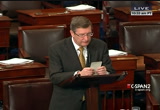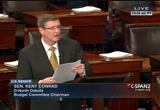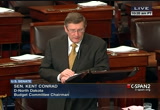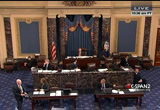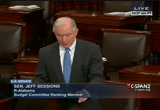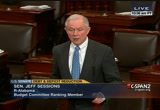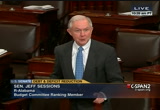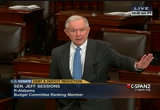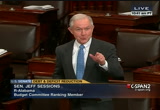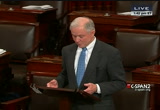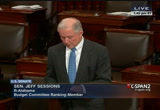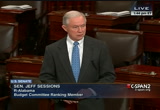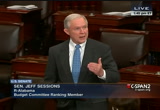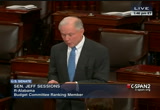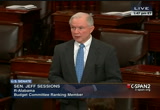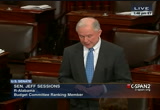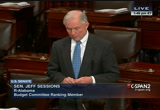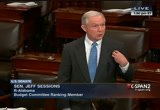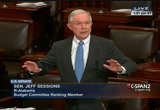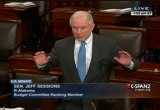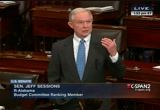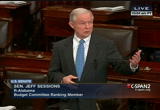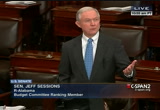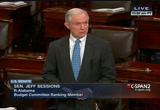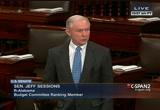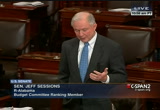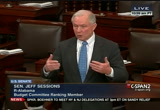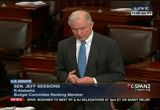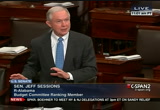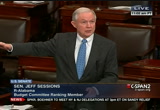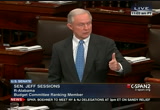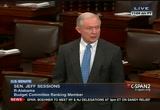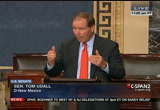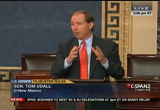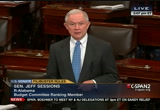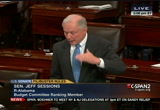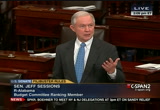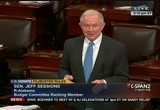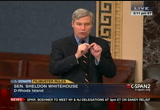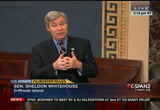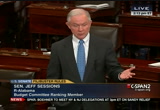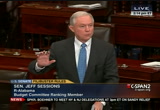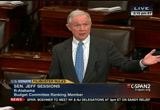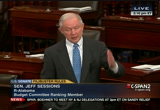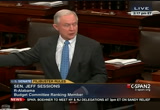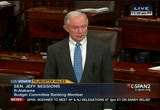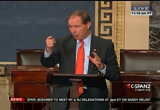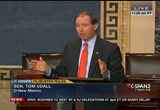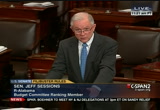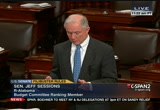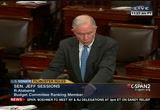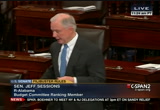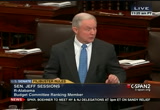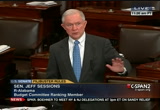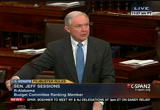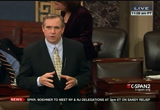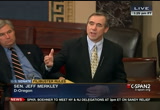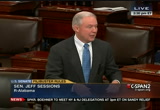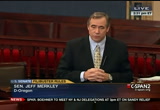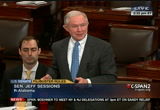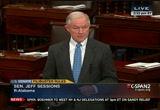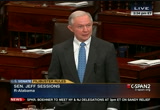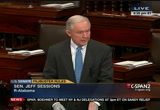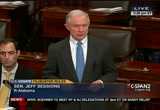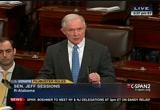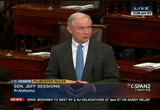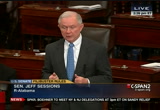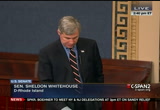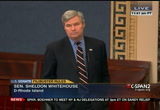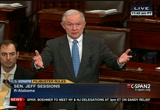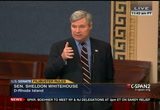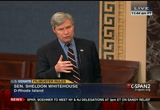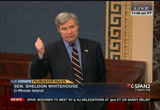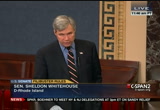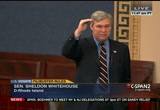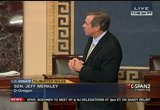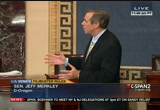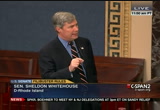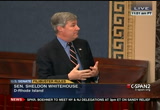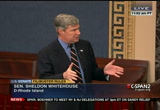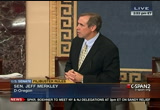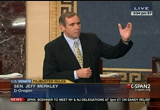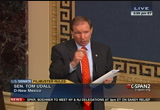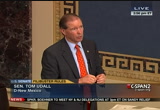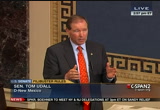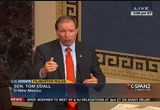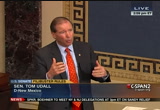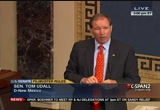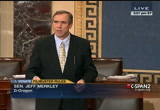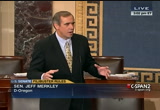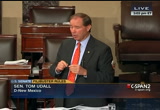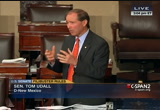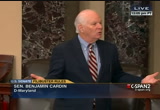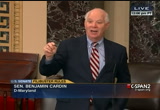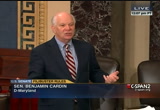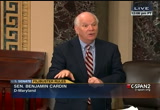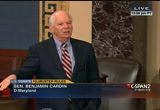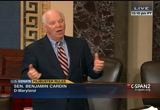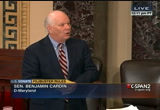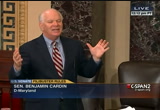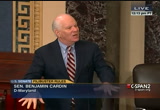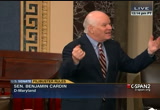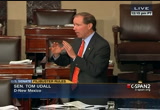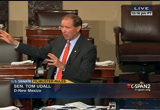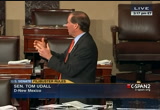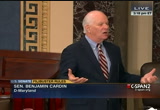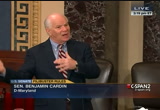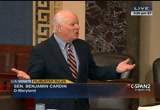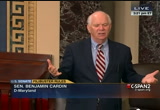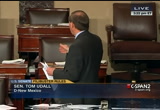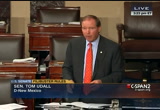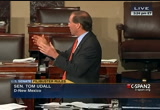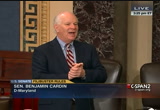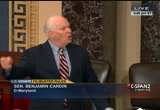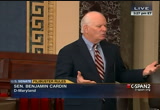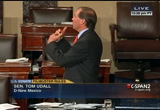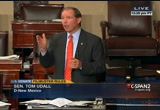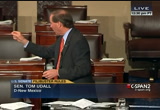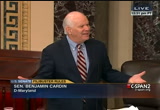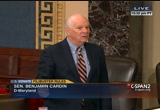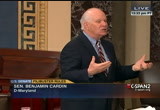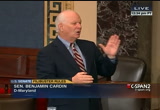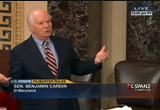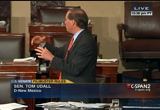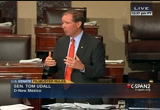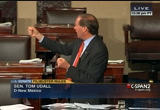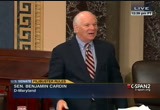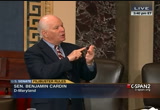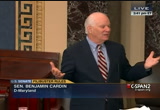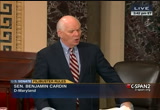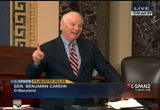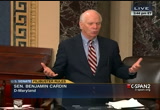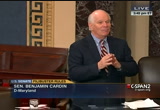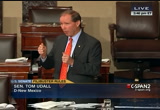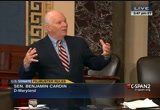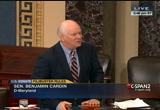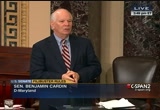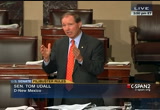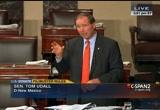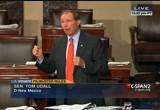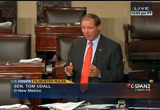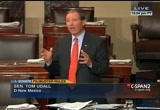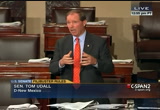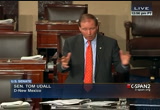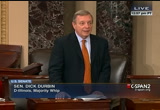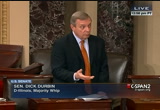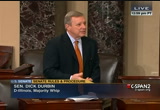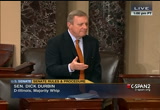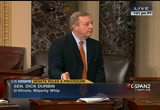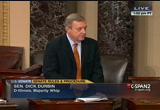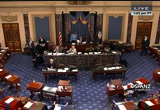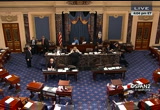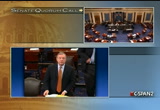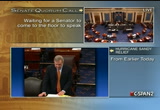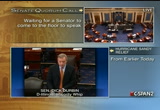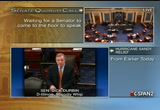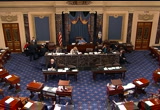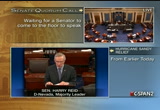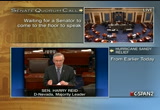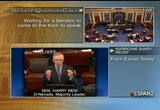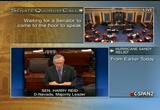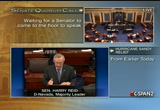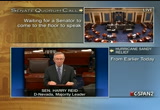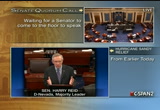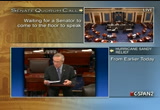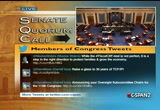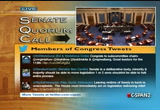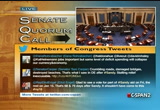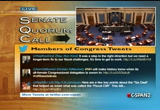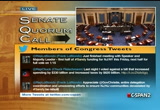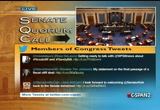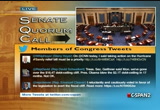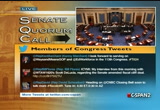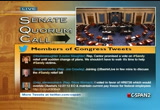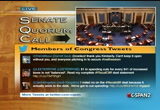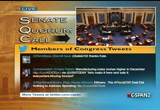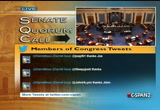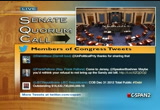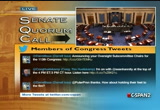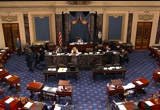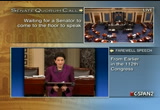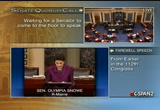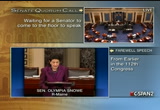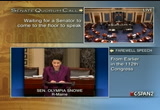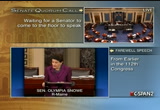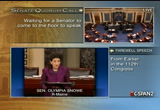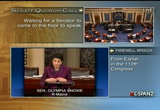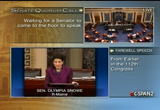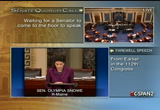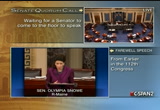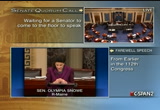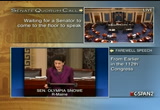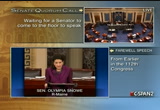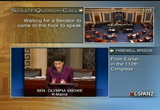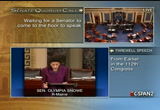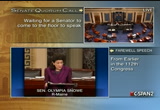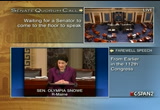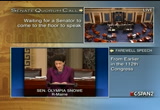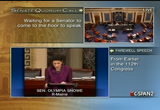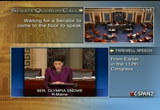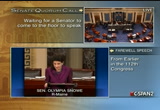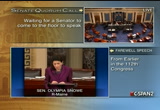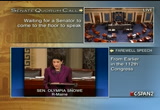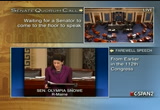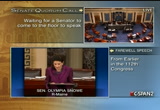tv U.S. Senate CSPAN January 2, 2013 12:00pm-5:00pm EST
12:00 pm
12:01 pm
the president pro tempore: the senate will come to order. the chaplain, dr. barry black, will lead the senate in prayer. the chaplain: let us pray. eternal god, today give our senators the second wind of your passion, power, and perseverance. fill them with the assurance of your presence. may they seek to live with the knowledge that you have chosen them to serve you and country. protect their thoughts and actions from temptation, as you control all they say and do by
12:02 pm
the power of your spirit, as their lives bring glory to your name. lord, remind them that they pass through this life but once, so that they must not take this day for granted, but live to honor you. we pray in your great name. amen. the president pro tempore: please join me in reciting the pledge of allegiance to the flag. i pledge allegiance to the flag of the united states of america and to the republic for which it stands, one nation under god, indivisible, with liberty and justice for all.
12:03 pm
the president pro tempore: the majority leader. mr. reid: would the chair announce the business for the day. the president pro tempore: under the previous order the leadership time is reserved. and under the previous order the senate will be in a period of morning business until 1:30 p.m. for debate only, with senators permitted to speak therein for up to ten minutes each. mr. durbin: mr. president? the president pro tempore: the senator from illinois. mr. durbin: after any statement by the majority leader, i'd ask consent to be recognized in morning business. the president pro tempore: without objection. mr. durbin: it is my understanding the majority leader is going to yield the floor to me at this moment. the president pro tempore: the senator from illinois. mr. durbin: mr. president, the state of nevada was admitted to the union in 1864. since 1864 there have been 25 senators in its 148-year history. today harry mason reid becomes the longest-serving member of
12:04 pm
congress in the history of the state of nevada. senator reid was elected to the u.s. house of representatives the same year that i was elected, in 1982, and became a member of the house in 1983. he became a member of the united states senate in 1987. he has served with great distinction in both houses of congress, serving his state of nevada. and today is the highest-ranking democrat in the united states senate serving as its majority leader. i would dare say, mr. president, that you and i will probably not really know anything about the town of searchlight, nevada, were it not for harry reid. harry reid has told us so many stories of his youth and his background in that tiny town and what brought him to this station in life today. i almost feel if there were a town or high school reunion i could attend it with harry and
12:05 pm
look around and recognize a lot of people there, because i've certainly heard stories about his youth and the people that had a dramatic impact on his life from the time that he was growing up in searchlight, neff. we know he came from modest circumstances. his family grew raised him in a very small home without indoor plumbing. he attended a two-room elementary school in searchlight, nevada. as a child, senator reid's father was a hard-rock miner and his mother took in laundry. he says of his parents that his father gave him quiet and his mother gave him confidence. opportunities were scarce in searchlight, but harry made the most of what he had. his book "the good fight" has a great opening prar that i'd like to -- has a great opening paragraph i'd like to share because it says what life must have been like in the town of
12:06 pm
searchlight. harry wrote "i come from a mining town. by the time i came along, december 2, 1932, the leading industry in nevada was no longer mining. it was prostitution. i don't exaggerate. there was a local law that said you could not have a house of prostitution or a place that served alcohol within so many feet of a school. once when it was determined that one of the clubs was in violation of the law, they moved the school." it says a lot about searchlight. it also says a lot about the circumstances that he faced growing up. he made the most of what he had. between hitchhiking more than 40 miles and staying with extended relatives, harry was able to attend basic high school, the nearest high school to searchlight. while at basic high in henderson, he met two people who dramatically changed his life. landra gould. she became his wife of 50 years and counting. and michael callahan, a coach,
12:07 pm
teacher, mentor and friend. harry reid said of michael callahan, he was the toughest man he ever met. harry reid played high school baseball with ray martinez who would become his chief of staff, donnie wilson who would also go to work for reid in washington. mr. president, i once invited ernie banks to my office. i invited harry reid, former baseball player in his youth, to meter ni banks. -- to meet ernie banks. ernie said what position did you play, harry. harry said i played catcher. ernie said i don't believe it. get in position. at that point i heard the bones creeing as harry reid crouched in my office and we all cheered. he won his first election in high school when he ran for junior class treasury. you knew he was going to win because landra, his wife-to-be wrote a speech that got him elected.
12:08 pm
ray martinez managed his campaign when he became senior class president. he also ran into a fellow i mentioned earlier, michael cal harpbgs who had such a -- callahan who had such a profound impact on his personal and political life, he now behind his desk has a picture of his friend and mentor governor callahan. harry reid also took up boxing after he was inspired by michael callahan, the toughest man he ever met in harry's memory. harry said in his book "the good fight," there are sluggers and there are boxers. i became a pretty good boxer. i could assess situations well and could exploit opposing fighters' weaknesses. i could hit hard and take a good punch." mr. president, you and i know that is a good background for the business today. with scholarship money harry reid left for college in southern utah and cedar city but he hated being that far away from landra so he moved back.
12:09 pm
harry married landra and they eloped in 1959 and rented from a loving mormon family, matthew and louise byrd. harry reid and landra decided to join the church of jesus christ of latter-day saints based on the wonderful family that served as their landlords. he said he didn't come from a religious family. he said the only religion he remembered is the love for franklin and delano roosevelt in his house. harry reid put himself through law school by working nights as a u.s. capitol police officer. in his book are pictures of harry in uniform as a capitol hill police officer and law student, a job callahan helped
12:10 pm
line up for him. he returned to nevada after law school and served as henderson city attorney. in 1970 at age 30, harry reid ran for lieutenant governor of nevada with his friend and mentor michael callahan running for govern. they won the race and harry reid served as lieutenant govern from 1971-1974 becoming friend to paul simon, then lieutenant governor for illinois. harry lost his race for u.s. senate in 1974 but he lost by fewer than 600 votes. governor callahan asked him to serve as chairman of the nevada gauge commission. when nevada's population growth led to an additional seat in congress, harry reid ran for the seat and won. he served two terms in the house, 1983-1987 before running for the senate. in 1986 reid won the nomination for the senate.
12:11 pm
from 1999-2005, harry reid served as senate democratic whip, as minority whip in 1999-2001 and again from 2003 to 2005, majority whip from 2001 to 2003. during those years as whip, harry reid lived on the floor of the senate. he developed a real understanding not just of the rules and procedures of the senate, but of the institution and the members. michael callahan died of a heart attack attending daily catholic mass in 2004, so he didn't live to see his good friend elected minority leader in 2005 or obviously majority leader of the united states senate. but i know that every single day that harry serves in public life, michael callahan is in his heart. mr. president, i listened this morning to some of the analysts talking about what just happened, this historic vote yesterday in the united states senate. some of them this morning who know little about what really happens here were diminishing the role played by harry reid. i can tell you that on the day leading up to the vote, the last day, december 31, i spent
12:12 pm
probably the better part of 16 hours in harry's office as the negotiations went back and forth. there were three parties to that negotiation: senator mcconnell, the president of the united states, and harry reid. there wasn't a minute that passed that e-mails weren't being transferred back and forth to put together the coalition that passed this historic measure and avoided the economic disaster that otherwise would have occurred. it wasn't the first time that i've seen harry in that position. behind closed doors without a lot of fanfare, playing a critical role in passage of legislation which really makes a difference for the average working families of america. a few years ago i worked with him as he led the effort to pass the health care reform act, a measure which i believe he shares my thinking, one of the most important we've had worked on in our lives. it never would have become law without his skill, determination and the trust that the members of the democratic majority had in their leader, harry reid. this is a day of course, in
12:13 pm
nevada history as much as american history. i recall one particular visit to his office,. i drop in frequently to see what is going on and to chat with him about the business of the senate and life itself. and i came in to see a young rocker called the killers sitting in his office. that's their name: the killers. and they're from nevada. harry told me this young group, popular as it is in other places, was especially popular in nevada because they performed the nevada state song, which is entitled "home means nevada." when i think about this historic moment today when harry becomes part of the history of his state, i recall one stanza from that song. it says "deep in the heart of the golden west, home means nevada to me." i can tell you, mr. president, in all my conversations over all the years, time and again conversations always return to his home state of nevada, his
12:14 pm
hometown of searchlight, and the people that he loves so much to represent the united states senate. it's been an honor to serve with this great man. i'm glad he's achieved this moment in history. i'm looking forward to many more years of service on behalf of nevada and the united states. the presiding officer: the leader. mr. reid: no one will believe this but i didn't know senator durbin was going to say a word. most of what he said is unimportant but i appreciate his efforts to try to make me look better than i am. i really do appreciate his friendship. we came as a couple of anxious people in the house of representatives 30 years ago. speaking for both of us -- and i can do that -- it was such a wonderful experience. for me, mr. president, my time in the house of representatives, the first three or four months i was there i kept thinking i was going to have to pay somebody because i was having such a good time. i didn't realize that the taxpayers -- it took me awhile
12:15 pm
to figure out they were paying me for a job that was so much fun. so i appreciate very much senator durbin's friendship. i so admire and appreciate him for all that he's done for me, the state of illinois and the country. and he's absolutely right about this. he had a mentor by the name of paul simon who had the good fortune to serve as we were lieutenant governors at or near the same time, we served in the house of representatives together and served in the senate together. what a wonderful human being about. senator simon was just like michael callahan to dick durbin has callahan was to me. he was not only the toughest man i ever knew, michael callahan, but the most honest, the most honest. when he would drive, he would never, ever exceed a speed limit, a posted speed limit.
12:16 pm
he was just -- he is -- he is somebody that i will always remember -- i could never be like him, in addition to being tough and honest, he had -- he could swear like no one you've ever heard. but only he could do it, this massive man who had almost 200 amateur fights before going to korea and losing his leg. such an exemplary person in my life. so i appreciate senator durbin mentioning him. but, to h me, callahan is just like this great man, paul simon, who -- i don't know how many books he wound up writing -- i'm sure it was 15-20 -- never went to college, he was just a brilliant man. so thank you very much, senator durbin. thank you very, very much. i appreciate it very much.
12:17 pm
mr. president? i'm really stunned by what happened -- what didn't happen in the house of representatives last night. i appreciate they, with the support of all but a handful of democrats and just a handful of republicans, they passed something to keep us from going over the fiscal cliff. and that's admirable. nancy pelosi is to be -- she deserves such accolades for carrying for their her weight for passing this bill. but one of things they didn't do last night -- i had aide like to read you to a letter -- actually it is an e-mail from a person by the name of barry kolstin. it was written, "one. most recognized shops in
12:18 pm
baltimore, new york. it was recently damaged by hurricane san day. building we owned and okay piewd for over 32 years with never a problem were terribly damaged. this storm compromised my building inside and out. the facilities within the building backing up pipe breakage, roof damage plus the horrid conditions that assaulted all the building in my immediate area. sandy decimated my building as well as the neighboring buildings. it perhaps was one of the most stable and viable businesses in baldwin, new york. my shop has been closed since the storm. we're doing our best a ford the restoration of the building and repair violas, cellos, basses. they were all so horribly damaged. we lost machinery, tools, supplies, and most all of our filed records. this is a nightmare, a true nightmare. and at the age of 63 i never thought i would be faced with this."
12:19 pm
mr. president, there are tens of thousands of people, tens of thousands of people in new york, tensions of thousands of people in new jersey and other parts of the northeast who have had their lives turned upside down. now, i am dismayed and really saddened that the house of representatives walked away last night, didn't even touch this. we spent so much time here on the floor doing something to help that beleaguered part of our country. i was happy to help with katrina. i was happy to help with that violent storm that hit job lynn, missouri. we all -- that hit joplin, missouri. we all were. we moved in quickly. it's been months -- months now you and these people are still suffering. governor cuomo, governor christie, they've doneary best with limited resources available when disaster like this owe cuss. this is to inin the law as an act of god -- this is known in
12:20 pm
the law us a an act of god. no one knew it was coming. no one had any idea what this terrible storm would do, the damage that it did. it was the perfect storm because you had different elements working together to create this terrible situation. so i repeat, i'm dismayed and saddened that the house of representatives adjourned last night without addressing the pressing needs of these people. millions of residents, there are still hundreds of thousands of people who don't have a place to live, whose homes and businesses were damaged or destroyed, as i've catted from this letter about this terrible disaster. its reait's really hearti can bo leave these -- it's really heartbreaking to leave these victims waiting for help. this storm damaged more than 00,000 home700,000 homes in neww
12:21 pm
jersey, and new england. we have the power to help our countrymen port their liberias together. we did it here in the snavment but the house walked away, just like they did with postal reform, just like they did with agricultural reform, our farm bill, and like they've walked away from so many different things this year. they left these people without help. they're gone. they've left. they're not in washington. and i'm disappointed we've turned our books -- and i don't include me in this operation or anyone ha in this 123459 -- buti am deeply disappointed that the house of representatives have turned their backs on people who are suffering. and please understand everybody, this does not include the
12:22 pm
leadership of leader pelosi, leader hoyer. they've done their best to gather their troops to help anytime anything is needed. but it's not who we should be as americans. just to walk away from these people. wintertime is now there. when disaster strikes, fire, floods, storm, or earthquake, we in the past haven't paused and we don't delay. but we have here. as men's we respond -- as americans we respond with haste when american lives are at stake and american communities are shattered. it is no wonder how people feel about congress. just leave town? they need to do better over there. we should have a postal reform bill. we should have a farm bill. the farm bill, by the way, it saves $24 billion, not million but billion.
12:23 pm
deb itie stabenow, the chairman of the agricultural committee, worked 10 hard to get this done. we had a bipartisan bill that passed the senate overwhelming overwhelmingly. why did the house of representatives drop it? well, they dropped it because the same pork-barrel programs that help people were taken out of the bill. so now we're on a short-term extension. so they need to do better over there, madam president. compromise is hard, we know that. sometimes compromise doesn't happen when we want it. compromise sometimes doesn't satisfy either side. as i've said here and other places, when i practiced law, mr. president, you had the concept ther it was a good settt when both sides walked out unhear, having reached a settlement. that's what we did here the
12:24 pm
night before last. actually it was yesterday. it was a piece of legislation we all weren't elated about, but it moved the ball forward. we have so many more hard decisions to make it the year ahead. so unlike others behind us in this capitol, i'm not going to stoop to name-calling. i just want people to work and do what they need to do. let the house of representatives work its will. let democrats and republicans in the house of representatives debate. they have an easier time over there. they can set rules on how you debate. they can set how long you debate, on what subjects. but let the body work its will, which hasn't happened. so it's a sad day when we turn our backs on millions of our fellow americans during their time of greatest need and that certainly is what's happened here. a senator: mr. president?
12:25 pm
mr. leahy: mr. president, i know the -- the presiding officer: the senator from vermont. mr. leahy: i know the distinguished majority leader is about to propound an agreement. i wonder if i could proceed for one minute? may i ask consent to proceed for one minute? the presiding officer: without objection. mr. leahy: mr. president, the majority leader is not a person to praise himself, but i will. i want to totally agree with the comments he made about how the session is virtually -- has virtually ended. but, mr. president, one of the -- it's only in recent time that i find myself presiding as often as i have because of other circumstances, and i'm glad that i was here to open the senate this morning to hear the
12:26 pm
distinguished senior senator from illinois speak about the distinguished senior senator from nevada. we first met when he was running for the senate seat. i had a campaign event in another state. we worked together at that time, became friends. from that day on we've actually spoken many times with our wives about that meeting in florida. and, mr. president, i consider it a privilege that i was on the floor today to hear these words. i join in praising my friend from nevada. he is a dear and wonderful friend. his wife and my wife are dear, wonderful friends. we both married way above ourselves. but i feel privileged to serve
12:27 pm
every day with the senator from nevada. i yield the floor. mr. reid: mr. president? the presiding officer: the majority leader. mr. reid: i appreciate the chairman of the judiciary committee, the president pro tempore of the senate, saying these nice things about me. it is an honor to have gotten to know him s so well, pat leahy. broken more records -- my record is minimum compared to the senator from vermont. first democrat elected, been in the are senate since 1972. wonderful senator, good friend. i appreciate him 10e67. -- i appreciate him so much. his lovely wife marcel is a nurse. during my wife's travail with a terrible automobile accident and breast cancer, which she's doing well, appears that she's beaten both of them so far, marcel has done a lot of good things for my wife, just with her nursing
12:28 pm
skills calling and telling her, well, what you're going through is what happens to a lot of peevment you're going to be a lot better. so i appreciate senator leahy and also his lovely wife marcel. mr. president, last december president obama nominated a person by the name of david medime -- that's medine, to serve as the chairman of a board. mr. medine -- it's obvious i don't know how to pronounce his name -- is well-suited to lead this board. he works on the financial privacy issues for the securities and exchange commission. previously he was a partner at a huge law firm, a press citijust law firm, worked with the federal trade commission on privacy and international
12:29 pm
privacy laws. we worked out on agreement with the senate republicans to confirm the part-time members of the board, two republicans, two democrats. the republicans agreed that mr. medine, the democratic nominee for chairman, the only full-time member, would be confirmed during the lame-duck session. it is my understanding the republicans have encountered an issue that prevented the senate from including him in our nomination package. so i'll ask consent on his nomination at this time and know that there will be a republican objection. early next congress, i plan to schedule a majority vote on this and look forward to cooperation and good faith from senate republicans on this nomination. so i ask unanimous consent the senate proceed to executive session to consider calendar number 721 and 722, that the 234078 nation be confirmed, the motions to reconsider be laid on the table, action, a that no further motions be in order, related statements be printed in the record and the president be immediately notified of the senate's action. the presiding officer: is there objection? mr. grassley: mr. president?
12:30 pm
the presiding officer: the toker from iowa. mr. grassley: reserving the right to object, and i will object, i would point out that the majority has had this nomination pending since may 17 when it was reported out of the judiciary committee hon a party-line vote. so not only for myself but i think for a lot of people on my side of the aisle, this nomination is controversial and should not be moved via unanimous consent in the waning hours of this congress. if this nomination was as important as the majority now seems to believe it is, this would warranted debate and negotiations earlier in the session. instead the majority now seeks to rush this nomination in order to avoid having to resubmit the name, the nomination for consideration. now i think i've shown a very different willingness to accommodate the majority even on controversial nominations. for example, we agreed to move
12:31 pm
william baer just last week despite the controversy surrounding his nomination, and he was subsequently confirmed. so i'm not opposed to discussing controversial nominations, including this one. but they need to be done in a way that allows debate and discussion prior to vote. given the controversial responses to written questions that this nominee provided, there is need for debate and discussion on this nomination by the full senate, not unanimous consent here at the last minute. therefore, i object to the nomination being considered at this time. the presiding officer: objection is heard. mr. durbin: mr. president? the presiding officer: the senator from illinois. mr. durbin: i ask consent to speak in morning business. the presiding officer: without objection. mr. durbin: i want to join in the remarks of the majority leader. what a disappointment to learn last night the house of representatives failed to bring up the supplemental appropriations bill which is providing relief for the victims
12:32 pm
of hurricane sandy. the senate passed this bill, you know, not that long ago; just a few days ago. $60.4 billion, a supplemental appropriation that passed here by a vote of 62-32; a strong bipartisan vote. it didn't include everything that the governors of new york, new jersey and other states had asked for but it did provide critical funding to help those who lost their homes and their businesses. we expected the house to act on this. this to say it's a no-brainer is to overstate the obvious. we rally as an american family when many of us are in need. i can remember this very well in my own state. in 2008, illinois and other midwestern states had a similar situation. a massive storm was hitting our -- heading our way and flooding the mississippi river was inevitable. i visited several towns along the mississippi back then including quincy, illinois. then-senator barack obama and i came to quincy and pitched in filling sandbags with thousands
12:33 pm
of other volunteers. we worked through father's day to help mitigate the on coming flood, but it still came and there was serious damage. just like the people in new york and new jersey, these people did everything they could before and after and during the storm to save their homes, businesses and lives of their loved ones, but the magnitude of our 2008 storm was too big for local and state governments to handle. the magnitude of the flood, just like hurricane sandy, required action from congress and the federal government. we passed a supplemental appropriations bill for illinois and the midwest in 2008. that aid was essential to helping in our state the victims of that flood. i've served in congress for over 20 years and every time -- every time -- some section of our nation has been victimized by a disaster, we've come together as an american family to help those who are in need. we draw on our national treasure and the efforts of the american people across the country to come to the rescue of our neighbors in need. the time to help new york and
12:34 pm
new jersey and other states victimized by hurricane sandy is now. but the republican leadership in the house abandoned those victims with a decision to let this bill die. in new york and new jersey, more than 651,000 homes were damaged or destroyed, 463,000 businesses were hurt or need assistance. according to the senators from those states that either matches or skpaoedz the phag ni -- exceeds the magnitude of the disaster of katrina that struck the states on our southern coast on the gulf of mexico. hundreds of miles of roads and rail were damaged and will need to be repaired. however, the rebuilding is on hold because of a political decision by the speaker of the house and republican leadership. i can tell you i know full well because senator schumer is in the leadership, and i watched as he and senator gillibrand, senator menendez, senator lautenberg and others have worked to build a bipartisan coalition in the house to pass this critical measure.
12:35 pm
all it needed was to be called by the speaker, and the speaker refused. but there's still time. there's time in the 112th congress for the house to pass the senate bill. i urgently beg the speaker of the house of representatives to put any political concerns aside and for the sake of these victims and victims of other disasters across america, pass this critically important bill as quickly as possible. i yield the floor. i suggest the absence of a quorum. the presiding officer: the clerk will call the roll. quorum call:
12:42 pm
the presiding officer: the senator from ohio. mr. brown: i ask the quorum call be dispensed. the presiding officer: without objection. mr. brown: thank you, mr. president. on sunday we confirmed carol galante as the new commissioner of the federal housing administration, the f.h.a. i want to thank my 19 republican colleagues who supported her nomination. it was an important step forward for f.h.a. special thanks to senator corker for his work on this, my colleague on the senate banking committee. my democratic colleagues and i have cleared an important commonsense piece of legislation on our side. it's passed overwhelmingly in the house. we've received little cooperation from some of our republican colleagues because it
12:43 pm
did not include everything that they want. it's clear the f.h.a.'s mutual mortgage insurance fund is facing significant financial issues. two years ago senator begich and i introduced an f.h.a. reform bill. for a time we collaborated with senator vitter from louisiana who worked with me on legislation with the g.a.o. and other things, and with senator isakson on that effort. so i know that many of my colleagues on -- republican colleagues are committed on these issues. unfortunately, some of their conservative colleagues blocked the legislation that would have given f.h.a. additional authorities to protect taxpayers. we shouldn't wait any longer. this is the, technically the last full day of this congress. we shouldn't wait any longer to enact sensible measures that will put f.h.a. back on a path to financial stability. with limited time left in the legislative session, passing the house's f.h.a. reform
12:44 pm
legislation, h.r. 4264, is necessary and is a responsible step to give f.h.a. additional authority to protect taxpayers. passing this bill won't prevent us from doing more next session. that's what i want to do. i think most members of both parties in the banking committee want to do that. i expect that we'll consider reforms very soon. in the meantime, though, we should pass this commonsense bipartisan reform measure. as i mentioned, it passed the house of representatives. it was by a margin of 402-7. so it has support all across the political spectrum, from people of all views and philosophies and ideologies. unfortunately surveil of my colleagues across the aisle continue to stand in the way of these taxpayer protections. i don't plan to ask unanimous consent today. i would like to do that. i won't do that. i'm hopeful that those who oppose this might be willing to come to the floor and discuss this and see if we can move this legislation on the last day,
12:45 pm
1:07 pm
1:08 pm
proceedings under the quorum call be dispensed with. the presiding officer: without objection. mr. conrad: thank the presiding officer. i thank my colleagues. this will be my final remarks to the senate, and i thought i would share with my colleagues my observations on what has just occurred and put in perspective where i believe we are and where we're headed and to lay down a challenge to my colleagues as i depart, because a very significant challenge remains for the congress and the country, and i hope very much that we find the courage to take these challenges on. it's critically important to the future strength of our nation, and we can do it. we've done much tougher things in the past. we can certainly take on these challenges. mr. president, new year's eve we were called to session, and we were briefed by the vice president and other staff from
1:09 pm
the white house with respect to the deal that was before us. i told our colleagues on that night that i believed we had to support the proposal before us because to fail to do so would send us back into a recession. most economists say the economy would shrink 4% in the first quarter, 2% in the second quarter; that a million more people would be unemployed, the two million people now o on unemployment insurance would lose that. so i saw no alternative but to support thisempt gray. at the same time i -- to support this agreement. at the same time i told my colleagues i hate this agreement. i hate it with every fiber of my being because this is not the grand bargain that i hoped for or worked for or believed is so necessary to the future of the country.
1:10 pm
mr. president, this is not by any standard a deficit-reduction plan. as necessary as it is, no one should be misled that this deals with our deficit and debt, because it only makes our debt circumstance worse. now, some question that assessment, but that is precisely the assessment that the congressional budget office has come to. and i would like to, mr. president, take just a few moments to put in perspective where we are. the united states is borrowing 31 cents of every dollar that it spends. that is an unsustainable circumstance. it's improved somewhat because we were borrowing 40 cents of every dollar we spend. so there's been some modest improvement. but, mr. president, this cannot go on. it has to be addressed or we will weaken the nation.
1:11 pm
this chart putes in perspective the spending and revenue of the united states going back to 1950. so looking back 60 years, the red line is the spending line, the green line is the revenue line, and you can see that our spending is close to a 60-year high. we're not quite at a 60-year high because there's been some improvement in the last two years. and we're close to a 60-year low on revenue. so our colleagues that say this is just a spending problem, i think, are missing the point. this is a problem of the relationship between spending and revenue. the gap -- much higher spending than we have revenue -- is what leads to deficits and lis to additions to the debt -- and leads to additions to the debt. the passage that we are on, we are told by the c.b.o., will take us from a debt of 104% of our g.d.p. today -- and this is the gross debt of the united states -- to 115% by 2022, if we
1:12 pm
fail to act. mr. president, further action is absolutely essential. why? why does it matter if our gross debt is more than 100% of our gross domestic product? because the best work that has been done by rogoff and reinhart concluded after looking at 200 years of economic history the following: "we asked the experience of 44 countries spaining unto two centuries of data on central government debt, inflation, and growth. our main finding is that across both advanced countries and emerging markets, high debt/g.d.p. levels (90% an above) are associated with notably lower growth outcomes." to sum it up, mr. president, when you have a debt -- the
1:13 pm
gross debt of more than 90% of our g.d.p., you are headed down a path that dramatically reduces your future economic growth. that means we are reducing future economic opportunity for the people of our country. mr. president, that is why this matters. because it will retard and restrict economic growth and opportunity for our people. and here's what the congressional budget office tells us is the long-term path that we are on. we're already over 100% of our g.d.p. in gross debt. but the c.b.o. tells us, we are headed for a circumstance that the debt will be 200% of our g.d.p. by the way, mr. president, this is not gross debt; this is the publicly held debt. gross debt is even higher, about 30 points higher than the publicly held debt. so, mr. president, we are on a course that is utterly
1:14 pm
unsustainable. if we look at what's been done -- because those who say nothing has been done are not giving the full story either. the fact is, we passed the budget control act in place a budget. we port in plac put in place a e of a budget resolution. that budget law dropped discretionary spending to historic lows. we were at -- in this year 8.3% of g.d.p. going to domestic spending. the budget control act, the law that was passed, will take that down to 5.3% of g.d.p. going for discretionary spending. that is an historic low. so anybody who says nothing has been done, that's really not accurate. we cut domestic spending and cut it in a very significant way, cut it to a level that will be
1:15 pm
an historic low. but that doesn't mean the problem has been solved. nowhere close to it. because at the same time, the nondiscretionary accounts are rising dramatically. medicare, medicaid, other federal health spending are the 800-pound gorilla. that's where we see such a dramatic increase in spending, both in real terms and nominal terms and a share of g.d.p. back in 1972, these health care accounts consumed 1.1% of our gross domestic product. 1.1%. by 2050, if we don't do something, they will consume 12.4%. mr. president, that is totally unsustainable. it is gobbling up bigger and bigger chunks of our budget, prught increasinputting increasn
1:16 pm
deficits and debt and eating up the flexibility of the united states to respond to crises that might occur. and the aging population is a primary driver of medicare, medicaid and social security cost growth. you can see in this chart the effect of cost growth is the yellow part of this chart. the effect of aging is the red part. and the spending in absence of aging and excess cost growth is the green part of this chart. in other words, our spending on medicare and medicaid and social security would actually be very stable absent the effect of aging and the effect of excess cost growth. and now the effect of aging has become the biggest driver. nothing we can do about that because these people have been born, they're alive today. they're going to be eligible for medicare. and social security.
1:17 pm
and we're going to have to find a way to be able to afford this combined effect. mr. president, the revenue side of the equation i think is critically important to understand. we have many of our colleagues who say, well, it's true that we are at a very low share of g.d.p. going to revenue today. less than 16% of our g.d.p. is coming as revenue to the federal government. typically it is about 18.5% of g.d.p. but, mr. president, if we look back on the last five times we've actually balanced the budget around here, revenue hasn't been 18 or 18.5% of g.d.p. the last time -- five times we've balanced the budget, revenue has been 19.7% of g.d.p., 19.9%, 19.8%, 20.6%,
1:18 pm
19.5%. so those who say, well, we just have to get back to the normal revenue stream, the average, i think miss the point. the average is not going to do it. it never has, at least going back to 1969. mr. president, we're going to have to have more revenue at the same time we have more spending discipline with respect to especially the health care accounts. and we need fundamental tax reform. this tax code is out of date, it's inefficient, it's hurting u.s. global competitiveness. the complexity imposes a significant burden on individuals and businesses. the expiring provisions create uncertainty and confusion. it's hemorrhaging revenue to tax gap, tax havens, abusive tax shelters. i've shown many times on the floor of the senate a picture of a little five-story building in the cayman islands called
1:19 pm
uggland house. uggland house claims to be the home to 18,000 companies. a little five-story building claims to be the home of 18,000 companies. all say they're doing business out of that building. i've said many times, that's the most efficient building in the world. how can 18,000 companies being -- be doing business out of a little five-story building down in the cayman islands? they're not doing business out of that building. the only business they are doing is monkey business. and the monkey business they're doing is to avoid the taxes they owe in the united states through shell games in which they show their profits in the cayman islands, where happily there are no income taxes to impose on those earnings. so they are avoiding showing their income here and putting it in the cayman islands, where they can shield it from taxation. we also desperately need to restore fairness. the current system contributes to growing income inequality. i don't know how anyone can conclude otherwise.
1:20 pm
you know, i've shown also many times on the floor of the senate the report on one building on park avenue in new york where the average income is $1.1 million of the people who live in that building. and the average tax rate that those people are paying is about 14% -- 1-4, 14%. the janitor in that building is paying a tax rate of 24% with an income of $33,000 a year. how is that fair? how can that possibly be considered fair? and these long-term fiscal imbalances simply must be addressed and revenue is going to have to be part of the solution. mr. president, martin feldstein, one of the distinguished economists in our country, conservative, chairman of the council of economic advisors under president reagan, said this about the tax expenditures
1:21 pm
of the country, because we are spending in the tax expenditures category of the united states $1.2 trillion a year. we are spending more through the tax code than we are through all of the appropriated accounts. you know, people say we're spending too much. yes, we continue to have a spending problem and a revenue problem, but we are also spending through the tax code. we spend more there than we spend through all of the appropriated accounts. here's what martin feldstein said about the need to reduce tax expenditures. he said, "cutting tax expenditures is really the best way to reduce government spending. almost fitting that tax expenditures does not increase marginal tax rates or reduce the reward for saving, investment or risk taking. it would also increase overall economic efficiency by removing incentives that distort private spending decisions. and eliminating or consolidating
1:22 pm
the large number of overlapping tax-based subsidies would also greatly simplify tax filing. in short, cutting tax expenditures is not at all like other ways of raising revenue." i'd say to my colleagues, we're going to have to raise more revenue, even after what has just happened. we're going to have to raise more revenue. we're going to have to cut spending. going to have to reform entitlements. it's as clear as it can be that those things are going to have to be done to get the country back on track. and here is one of the most distinguished economists in the country telling us that reforming tax expenditures is not like other ways of raising revenue in terms of its economic effect. mr. president, i think mr. feldstein has that exactly right. and, by the way, who most benefits from these tax expenditures? well, here's a chart that shows the increase in after-tax income
1:23 pm
from tax expenditures. and here's the top 1%. on average, they benefit per year by over a quarter of a million dollars. mr. president, the next quintile benefit by $32,000. the lowest quintile benefits by tax expenditures by $707 a year. wow. what an extraordinary disparity. the lowest quintile tax expenditures benefit, $707 a year. the top 1%, their benefit from tax expenditure expenditures on, over a quarter of a million dollars a year. mr. president, here we are. borrowing 31 cents of every dollar we spend. we're on a course taking the debt of the united states from
1:24 pm
over 100% of our gross domestic product to over 200% if we fail to act. mr. president, that's why we had the national commission on fiscal responsibility and refo reform. and the report that we put out was called "the moment of truth." mr. president, what we called for in that report was $5.4 trillion in deficit reduction. we used the current baseline. that's what we would have provided, $5.4 trillion in deficit reduction. we lowered the deficit to 1.4% of g.d.p. in 2022. we stabilized the gross debt by 2015. we reduced discretionary spending to 4.8% of g.d.p. by 2022. we build on the health reform savings. we called for social security reform and savings to be used only to extend the solvency of social security itself.
1:25 pm
and we also included fundamental tax reform that raised revenue and did it, in part, by reducing those tax expenditures i just referred to. mr. president, here's what would happen to the deficit as a percentage of g.d.p. under the fiscal commission budget plan. you can see 2012, deficit 7.6% of g.d.p. it was taken down to 1.4% of g.d.p. under the plan. mr. president, here's what would happen to the gross debt of the country as a percentage of g.d.p. under the fiscal commission plan. from 104% of g.d.p. in 2012 down to 93% of g.d.p. in 2022. stabilize the debt then begin to bring it down. that ought to be our challenge. mr. president, the plan that was just passed took individual rate increases from 35% to 39.6% for
1:26 pm
couples earning over $450,000. capital gains and dividends were increased from 15% to 20%. pep and pease was reinstated. the estate tax was increased to 40% for those estates above $5 million. the alternative minimum tax was patched on a permanent basis to prevent 30 million people from being caught up in the alternative minimum tax. it extended other expiring provisions. on the spending side, the doc fix was put in place for one year to prevent doctors who provide care for medicare eligible beneficiaries from taking a 28% cut. it turned off the sequester for two months, the $1.2 trillion across-the-board cut in discretionary spend, both defense and non-defense. it provided for a one-year extension of unemployment benefits and also for a one-year extension of the farm bill. mr. president, again, while i
1:27 pm
believe that plan had to be supported -- and i did, albeit reluctantly, because i think if we had failed to support it, we'd be headed back into recession, an additional million people would have lost their jobs, the unemployment rate would be headed to 9.1%, and 2 million people would have lost their unemployment benefits. so there was good reason to support that plan. but, mr. president, i want to end as i began, i hated that plan. i hated it with every fiber in my being, because the truth is it increased the debt of the united states. and that's just not my word. that's the word of the congressional budget office that tells me the revenue loss from that plan is $3.6 trillion. the new spending, $332 billion. the total impact on the deficit
1:28 pm
and debt, $4 trillion. and that doesn't account for the additional debt service, which is another $650 billion. so the total increase in the debt as a result of that plan is over $4.6 trillion. so don't let anybody tell you that was a deficit reduction plan or a plan to deal with the debt because it was not and it is not and that leaves the unresolved challenge of our time. because for this nation's futu future, it is critically important -- it is critically important -- that the next congress in its early days try get back to doing the grand bargain, the big deal, something that would reduce our deficits and debt by at least $4 trillion over the next ten years, to stabilize the debt to begin to
1:29 pm
bring it down. mr. president, i -- i leave here in many ways with a heavy heart, because i came here 26 years ago believing one of the foremost responsibilities of a senator was to guide the fiscal affairs of this country. i'd like at this point just to enter into the record the announcement speech i made in 1986 in running for the united states senate. the presiding officer: without objection. mr. conrad: let me just read a couple of paragraphs from that, but i'd like the whole statement entered in the record. this is what i said 26 years ago in my candidacy for the united states senate -- "i've concluded that the serious economic problems facing our state can in large measure only be addressed in washington. it's economic policies decided in our nation's capitol that are pushing our state into a difficult financial position. since 1980, our national debt has doubled, our national operating deficit has tripled,
1:30 pm
our trade deficit has increased sixfold and we've become a debtor nation for the first time in 71 years. we can do better. we must do better. and we will do better if we have the courage and leadership to move this country in a new direction. current economic policies which have increased the national debt in five years by an amount that had taken 200 years to accumulate have forced record high real interest rates. those record high real interest rates have bloated the value of the american dollar which, in turn, has put a hidden tax on every commodity exported by our state and nation. that hidden tax has robbed us of our export markets and dramatically reduced our commodity values. those economic policies are not only devastating to the economy of the state of north dakota but are rapidly exploiting the economic strength of our country. this process must be stopped i said in the next paragraph and ao*eupl end here and put the
1:31 pm
statement in the record. it is time to stop posturing and start guaranteeing results. then i made a pledge. i pledged today if elected real interest rates would be brought under control or i will not seek reelection in 1992. that was a statement i made 26 years ago. some people probably are wondering if you made that pledge, how are you still here. well, six years after i made that pledge, i announced i wouldn't seek reelection, and i did not. i announced in april of that year i would not seek reelection. congressman dorgan was nominated to run for my seat, and i thought i was leaving the united states senate. then the other senator from north dakota died in september of that year. the governor called me and said, senator, you've got to run to fill out the two years of his term because our state is going to lose all of its snort in one -- all of its seniority in
1:32 pm
one fell swoop. we will be the only state in the nation with no seniority. you'll have kept your pledge; you didn't seek reelection. you will run in a special election which will be in december after the regular elections in november. i'll never forget one of the news media stations back home did a poll and two-thirds of republicans thought i should run to fill out the two years of that term, which i did. which means i am the answer to a trivia question because i am the only senator in history that served in both senate seats from the same state in the same day. mr. president, i believed then and i believe now the fiscal responsibility is one of the first obligations of government. and my deep regret, my greatest regret in leaving here is we have not been able to fashion the grand bargain to put us back on track. mr. president, i'll ask that that statement be made part of
1:33 pm
the record. the presiding officer: without objection. mr. conrad: mr. president, i ask unanimous consent to have a tribute to the budget committee staff that served so ably and so well, served this body, served our country. led by my staff director mary naylor, truly a remarkable person. i consider her a real patriot because she has absolutely dedicated herself to getting the fiscal affairs of the country in order. if i could put in the record a tribute to all of the budget committee staff that have served with me so ably and so well. the presiding officer: without objection. mr. conrad: and i would also like to mention my personal staff: sir garland, my chief of staff, really an extraordinary person, north dakota native; somebody who has dedicated herself to public service. jerry gadinees, with me more than 20 years, also a north dakota native. we call her mom in our office because she does a good job of keeping us on track.
1:34 pm
tracy sutton, my legislative director, also north dakota native, exceptional person. she will be on the staff of my succeeding colleague, senator- elect heitkamp. susan king. barry pyatt, communications director. mary joe prouty, office manager, still laboring to close down our office. molly spathe, with me right here to the final days. i want to give special recognition to sean neery, my communications director for many years who is now the communications director of the finance committee, truly an extraordinary person. and with that, mr. president, i want to thank stu gerka, my
1:35 pm
communications director on the finance committee, somebody who has an extraordinary record in government service, served bill richardson, governor of new mexico. when he was in public service in washington, stu was his communications director and did, i think as everyone knows, an outstanding job. his son, i want to note, is our page. gerard called back into service because of these days; a little short of people. they have been people who i have the highest regard for. stu negerka, i mentioned mary naylor, my extraordinary staff director. i have mentioned and go into detail all of my budget staff in this statement that will go into
1:36 pm
the record. my colleague on the budget committee, senator sessions, is here. senator sessions has been the ranking republican. he has been a gentleman. he has been somebody that i have enjoyed working with. he and his staff have been professional. i think we put on a series of hearings that laid out the issues for our country in a clear and undeniable way. again, i leave with only one true regret, and that is we were not able collectively to put in place a plan to get our country back on track. but i'm not without hope, because next year, this year, later this year we'll have more opportunities to do what needs to be done. i thank the chair and yield the floor. the presiding officer: the senator from alabama is recognized. mr. sessions: mr. president, i was so pleased to see senator conrad was here that i could join, follow him -- mr. conrad: if the senator
1:37 pm
would hold for one minute? i've just been handed something. mr. sessions: i'd be pleased to yield. mr. conrad: would it show in the record as not interrupting remarks. i ask unanimous consent that on wednesday, the majority leader be recognized to sign duly enrolled bills or joint resolutions. the presiding officer: without objection. mr. conrad: i ask unanimous consent the period for morning business be extended until 3:00 p.m. for debate only with senators permitted to speak for up to ten minutes each. the presiding officer: without objection. mr. sessions: mr. president? the presiding officer: the senator from alabama is recognized. mr. sessions: i'm delighted that i was able to follow senator conrad this morning. i had another subject i wanted to speak about, an important subject. but it's very important, i think, for all americans to know how well he has served. so i would ask consent, mr. president, that i be allowed to use as much time as i consume. the presiding officer: without objection. mr. sessions: senator conrad
1:38 pm
is one of the very small group of people in this country that understands the debt challenges we face. he has been on the debt commission. he has been the budget chairman. he staked his first election on dealing with these issues, as he's explained to us. and i truly believe had he had a little more support maybe on his caucus and others, his vision could have been a real part of the solution we would make to this debt crisis. we're not that far apart when you consider the true challenges this nation faces financially. i remember a little over two years ago now when you call debt committee chairman, commission chairman, senator -- the debt chairman that came and gave a
1:39 pm
speech, written testimony that said this nation has never faced a more predictable financial crisis. i remember you asked the chair, cochairman, erskine bowles, it was erskine bowles you asked when might we have this financial crisis if we don't change our way? and he said it could be two years. as close as two years. and that was two years ago; over two years ago now. so we've, i think, senator conrad, maybe gotten a little overconfident. people were telling us we were on an unsustainable course. we're facing a potential crisis. the rogoff and reinhart book comes out that says debt reaches 9% of g.d.p., and all of that was discussed and we had a lot of excitement about it and we
1:40 pm
didn't act, significantly we didn't act in a significant way. and team has gone by, and maybe people have thought the crisis is never going to happen. but i think you'll agree the potential for it to happen is just as real, if not more so than it was two years ago. i just want to say this. we didn't always agree. you didn't always agree with my views. and i understand that. but you allowed the minority on the committee to have its voice heard, to ask our questions, and you called some great hearings. and we had some of the best minds in the country. and you allowed and called administration witnesses, and we were able to examine them about how they were managing the country's money. and you allowed that to happen. in the great tradition of the senate where we have open debate and honest questions. and you were always a perfect gentleman. and always able, as i think the
1:41 pm
presiding officer would acknowledge, to give a little levity to a tense situation; a great sense of humor that really endeared me to you. so i would just say, senator conrad, thank you for your service. i believe every member of that committee, republican and democrats, appreciated your leadership. i know they did. i know the staff respected your leadership, and your fine staff, we had a great time working with your professional team. and you served your country exceedingly well, dealing with the greatest issue we face today: our financial debt situation. and i hope and am confident you will remain active, that you will not be silent, that you will provide continual input and advice to the members of congress as we wrestle with these tough issues.
1:42 pm
mr. conrad: mr. president, if i could say -- the presiding officer: the senator from north dakota. mr. conrad: thank to my colleague senator sessions. he will still be on the budget committee, and these raepblgs -- challenges remain. i will lend my voice in whatever way i can through the responsible efforts that are needed to get us back on track. it is truly my fondest wish, my fondest wish that we find a way to come together to do what must be done. it would be so good for the country. it would be great for the congress. it would be good for the people. and i'm confident -- i'm confident -- that this is a challenge we can meet. i thank the senator. mr. sessions: mr. president? the presiding officer: the senator from alabama. mr. sessions: i just want to again repeat my admiration and affection for the senator from north dakota and appreciation for his leadership. mr. president, i want to say
1:43 pm
some things that are pretty hard right now. i say them out of affection and concern for the senate of the united states and for the way we're conducting the people's business. and i believe they ought to be heard, and all of us ought to think about it. some of our new members haven't been involved in a senate that functioned differently than the one we're participating in today. they don't know really how a real senate should operate. we've gradually and at a very accelerated pace in recent years made some very unwise choices about how we do the people's business. this has been the most dysfunctional senate in history, and the senate -- and the majority has abused and altered the power and duties of the
1:44 pm
senate more than any time in history, to the detriment of the institution and to the detriment of the public interest. that's a hard thing to say. i truly believe something very unfortunate has been occurring, and people haven't talked about it. and i would criticize the republicans a bit here because we are supposed to be the loyal opposition. the majority always has pressures on it to advance an agenda and do these things, and the loyal opposition has a duty to advocate for its views and make sure the institution is handled in a way that protects the institution as a majority seeks to advance its agenda. and i don't think we've done a good enough job at that, frankly. but i would say that the majority is using tactics, i refer to them as postmodern tactics, to advance an agenda,
1:45 pm
and in doing so in a way that has done damage to the institution. our leader, senator reid, won't acknowledge a single error in his aggressive leadership and movement of legislation. he simply blames all the problems on the republicans, who he says are obstructing his vision, his goals he and his team want to advance.not satisfs have brought the senate to one of its lowest levels of public respect in the history, if not the lowest, the majority party is now demanding even more pow power. the majority leader and the majority is threatening to violate the rules of the senate to change the rules of the senate, to grab even more power.
1:46 pm
i would say that this majority has abrogated more power and certainly the majority leader himself has obtained more power than any in history, and they're asking for more. our colleagues -- we don't like to talk about this. we're reluctant to talk about what's happening and be as critical as i am today, but, in fact, we've been silent too long. at bottom, this is more than about politics. it's about the historic role of the united states senate in our constitutional order. this national is not functioning as it should, and that's for sure. we all may agree on that. the question is why. perhaps it was the 2010 election where the democrats took a shellacking and lost six senate seats. at that point there seemed to be
1:47 pm
a doubling down of the desire and the act of the leadership to come to -- and the ability of the leadership to dominate this institution. actual senate rules, actual codified law, and certainly the traditions of the senate were eroded. they were changed, they were run over. and the republicans who fought back were called obstructionists. i don't know, maybe when you have been in power a long time as a leadership an -- and the democratic side has -- you begin to think you're entitled to get all these things done, and you're entitled to bring up bills and not have senators offer amendments and slow down your train, that you're entitled to pick and choose what amendments the opposition can offer and how long they can
1:48 pm
debate. maybe this goes in your mind in a way you get in that cocoon of power and everybody becomes your obstructionist when they simply insist on the rules of the senate. i always thought senator reid, one of his charms -- the old harry reid i knew -- was that he could really actively and aggressively talk politically and stick it to the opposition. you almost -- you always got the point sometimes you could admire his skills and he could do it with a smile, and we all tolerate a little political license, a certain amount of political exaggeration in this world that we live in. but i thought that senator reid would not seek to advance powers
1:49 pm
beyond what he understood were the limits of the majority in the senate becausees a been in the minority, and he's operated there and had to fight for his rights to have full minority rights. so i'm a little baffled. uma noi'm not sure i understands new harry reid, this new senator reid that we like and i am not sure he's making some decisionss that are good. now we're talking about a nuclear option that would change the senate -- it would break the rules of the senate to change the rules of the senate, and it is a very dangerous thing, and i do not believe it is necessary. let me describe what's happened. i'm going to make a complaint about how this senate has been operating. i said it's dysfunctional, and the majority has said the reasoning it's dysfunctional is because republicans object too
1:50 pm
much, and they're obstructionists. but let me point out some of the things that are actually occurring. first, i would dispute that. i don't believe that's accurate. i don't believe republicans are anymore vigorous of their defense of their ideas than the democrats were when they were in the majority when i came in the minority, when i came to the senate 16 years ago. i know they're not. so little constraints, you know. the constraints that we operate under every day. rules, extradition, actual statutory law that control how we conduct our business are being eroded, gone around, run over. these are the things that make the institution what it is. you have to be able to accept the fact that those who disagree
1:51 pm
with you have at least some power and they have a right to have their voices heard, and their ideas heard and their amendments brought up. it is one of the great traditions of the senate. so i sort of will met foreically here say that i'm going to tack on the walls of the senate a few charges. i don't take pleasure in this, but it's time to tell the truth about it. first, to a degree unknown in the history of the senate, the majority leader has used his power under rule 14 to bring bills straight to the floor without minority leaderral committee process. violating and avoiding the process that goes on in committee, where members offer amendments, they have debates, they've called expert witnesses, they consider these things -- it may take weeks and months --
1:52 pm
finally a bill ripens and then it is brought to the floor. but the majority leader does have pounders rule 14 to bring a bill to the floor without having had that committee process. the committee process is public. the debate is transcribed much the amendments in committee are voted on and recorded. it holds the senators accountable. their public -- constituents know what they've done and they know how a bill is progressing and whetherty end they like it or don't like it. this legislation didn't didn't go through a committee process. it was a big, important piece of legislation. we've got a finance committee that's supposed to decide taxes. that wasn't brought up. no amendments brought directly to the floor. it is a very bad process. we are really too often using
1:53 pm
midnight-hour votes an votes one of a crisis to ram through big, historic legislation that's nevada been debated. we didn't even have the opportunity to read the legislation, the night before last, early yesterday morning, i guess. this is not the way to run the senate. what we know is now a preliminary estimate from the congressional bucket office is that 58% of bills that came to the floor of the senate did not come through committee, mr. president. that's nearly 60% of the legislation not brought through the senate. and what we -- and that's not good. number two, while the majority leader and the majority were
1:54 pm
quick to block president bush's recess appointment attempts, some of them were dubious, some of them probably were okay. they stopped -- they stood up and blocked that. they had the majority. they've done nothing to defend the senate's historic and constitutional role when president obama made a much more blatant recess appointment. the institution itself was weakened by this act. the senate has to again its legitimate powers, confirmation powers, and there's a limit on the president's ability to initiate recess appointments. the majority leader, righteous to defend it against president bush, now the leader of this institution has allowed president obama to weaken the confirmation process. and that goes beyond just the
1:55 pm
politics of the moment. maybe it furthers a short-term political agenda but not the long-term interests of the snavment the majority has directly violated the formal role of the senate and plain statutory law that requires the senate to produce a budget every year. the budget control act of 1974 sets up a public legislative process, a public process, by which both the house and the is not must openly confront the nation's fiscal challenges every year and lay out a plan. for three years the majority in the senate has refused to comply with the law simply to avoid public accountability. the majority leader said it would be foolish to have a budget, his direct emote quote -- his direct words. senator conrad, chairman of the budget committee, was clearly
1:56 pm
unease inti this. senator conrad was determined, at least in his committee, on which i serve with him, he was going to bring up a budget, we were going to discuss it and we were going to mark it up. and then it would be up to the majority leader whether he ever brought it to the floor, because he didn't bring it to the floor the year before. we've gone three years now without bringing a budget to the floor. and partnersly the caucus, the majority -- and apparently, the caucus, the majority, had a meeting and within a day of the budget committee markup occurring -- and we were prepared for it; my staff had studied it; we had made amendments and we were going to offer ideas to the budget -- it was canceled, onl. only a shell of the matter went forward and no budget offer
1:57 pm
offered. directly contrary to the statue of the united states. the budget act requires an ape process with committee votes and floor votes and 50 hours of debate in which senators who proposed a budget or opposed a budget have to do so publicly and accountably and people can offer amendments and you have to vote on them. senator reid was thinking he was foolish to have his members tombly have to to vote on concrete proposals. he didn't want tome them to do so. apparently the previous alexander hadn't gone well enough and he wanted to protect his members from the votes. it was toolish political politically -- it was foolish for the political party. and it can be passed with a simple majority.
1:58 pm
republicans can't filibuster a budget. they get to offer amendments for a change around here, but they don't get to filibuster it. they get an up-or-down vote, 50 votes, after 50 hours of debate. but the reason was that the leader would violate plain statutory law that requires us to have a budget by april 15 is because he didn't want his members to be accountable. but he blames republicans for being obstructionists. so for the first time in history, the senate has abdica abdicated the most fundamental requirement of congress -- responsible management of the money that the american people send here. we violated that requirement. not a single one of the 13 are
1:59 pm
appropriations bills were brought to the floor this year, not one. that's the first time in history. we did a research ton. there's nevada been a time in which -- there's never been a time in which a single bil sings been done. so the president can't spend any money congress has appropriated. the fiscal year begins october 1. congress is posed to pass the appropriations bills telling the president and all of his cabinet people how much money they have to spend in the next year. that's a fundamental requirement of the united states senate. that's not just an idle idea. it is a fundamental requirement. so we get at the end of the year nothing has been done. september 30 or whenever the last date was, we just passed a continuing resolution, a c.r., stacking all these 13 bills,
2:00 pm
1,000-plus pages of spending in one continuing rulings, and we just fund the government with no amendments, no debate, no discussion for six months. that's no way to run a government. you're supposed to bring up each one of those bills -- defense, highways, education, health care. and people have amendments they bring up ways to save more money or spend more money. you're supposed to vote on them. for the first time in history we didn't do that. so this was perhaps a clever political maneuver, and it avoided public debate and public accountability because, well, we had an election coming up. we don't want to vote before an election. and for the first time in 50 years, we are allowed the fiscal
2:01 pm
year to conclude and it was well after the election, just a few weeks ago, that we finally were able to pass a defense bill. okay? the house has sent over here a budget that lays out a firm financial course for america. that budget they voted on in public, they were prepared to defend and explain. it would have changed the debt course of america. but what did the senate do? nothing. did the republicans filibuster the budget, did they block a budget from being up -- brought up? no. republicans demanded that we go through the process. we pleaded with them to have a budget hearing in the committee. we asked them to bring up the budget and noted they have the power to pass a budget with the
2:02 pm
simple majority. and that's a burden that a majority party has, really, to bring up a budget and pass it. it's not easy and it's a challenge, but it's the first time we've ever gone three years -- maybe first time ever we've gone through a situation in which they refused to even bring up a budget. we've had in the past budgets fail, but we haven't had one to my knowledge where we just go for years and refuse to even bring one up. i know we had in that secret budget control act deal, we set spending limits on most of the discretionary spending accounts but that's not a budget. there were no amendments. there was no public discussion, no committee hearing, no floor debate, no 50 hours to deal with the great issues of our time.
2:03 pm
and, finally -- well, one more point. the -- the majority leader has been trigger happy in filing cloture motions. we have altered the way the senate operates. you have to plead with somebody to be able to get an amendment in the united states senate today. it's amazing. this goes against the history of this institution. the two great guarantees in the united states senate, as robert byrd, the great majority leader and historian of the senate, has said is the right to debate and the right to amend. those are fundamental. we're seeing an erosion of both. so what does this cloture motion do?
2:04 pm
so senator reid said, i'm going to bring up a certain bill and you republicans, you all can have five amendments. well, we've got 15 amendments we want to debate, maybe more on a bill. somebody reminded me the panama canal bill had 80 votes to give away the panama canal. they eventually got two-thirds votes and passed. but it went through weeks and lots of amendments. that's what the senate's about. so they say no. so that begins to cause a problem. so he says you've got a filibuster, you won't agree to my limited number of amendments, we -- you're obstructing, i'm going to file the bill and immediately file to end debate. so 30 hours goes by he and has a vote and ends debate and says all this time, you republicans are filibustering, you
2:05 pm
republicans obstructing. he files cloture when the bill's -- as soon as it's filed. that's -- that's not an accurate statement of the situation. a senator: would the senator yield for a question, asking through the chair? mr. sessions: i would yield for a question. the presiding officer: the senator from new mexico. mr. udall: the senator from alabama, who i think we overhappened as attorneys general and we're good friends, raised this whole issue and he used the phrase which has been frequently used on the republican side, that we're -- and we're getting to this place where we have the opportunity to change the rules. and the phrase he keeps using "break the rules to change the rules." but -- and this goes to my question. is the smart aware that under the constitution -- and
2:06 pm
specifically at article 1, section 5 -- it says that the senate may determine the rules of its proceedings? and as far as i know -- we have a letter, we're going to put it in the record later -- almost all constitutional scholars in this country and three vice presidents sitting up there where senator cardin is sitting presiding have ruled that at the beginning of a congress, in the first legislative day, ura you e allowed to change the rules. and the constitution trumps the senate rules in that respect for that very early period. and so my question to the senator from alabama: does not the constitution trump the senate rules? the presiding officer: the senator from alabama is recognized. mr. sessions: mr. president, the constitution does trump the senate rules.
2:07 pm
but i would ask my colleague if he's aware of any time in the history of the republic that we didn't follow the existing rules which say you should have a two-thirds vote before you change the rules? the presiding officer: the senator from new mexico. mr. sessions: let me just finish. mr. udall udall: can i answer te question? mr. sessions sessions: i've gotr and i'll yield in just a second. but i'm not aware of that ever happening. and i would ask my good attorney general colleague, who's familiar and understands tradition and the power of precedent, what would keep a republican majority next year, or if they were to obtain one in the senate, for changing the rules again, and again and again and again? the tradition in this senate has been that to change the rules, you use two-thirds vote.
2:08 pm
and we've adhered to that rule. there have been some threats to do the nuclear option, they call it, to use a simple majority to change the rules of the united states senate, but it has not happened. and i think that's a dangerous thing. and i would ask my colleague to consider that because you're a young and a popular senator and you're going to be here a long time -- longer than i -- and you may be in the minority. that might be a dangerous thought for you -- may be unimaginable today. but it can happen. we havwe had 55 senators just aw years ago. in two cycles, republicans went from 55 to 40. so i just would say to you, be careful about this. i know you believe in debate and you're capable at it and you don't want to be able to put circumstances up there that
2:09 pm
would endanger that. i -- the points i were -- was making was this, that the problems in the senate are not fundamentally the rules of the senate. the problems in the senate is a desire by the majority to move its agenda with a minimum of objection and to eliminate frustrating procedures that obstruct their ability to do what they think is good for america. but i have that view too. one reason when i -- we had the majority, we wanted to pass the tax cuts, the bush tax cuts, 90% of -- 99% of which was extended two nights ago -- the bush tax cuts, and it was passed for a limited period of time, ten years. why? because it took 60 votes to pass the tax cuts. and our democratic colleagues didn't want those tax cuts passed. and it was passed through the budget.
2:10 pm
and you could only do a ten-year budget. so they were passed as part of the budget process with 50 votes but could only last for ten years. so that's the rules. and then they expired. they got extended. president obama extended them once. but we got to the end and they were about to expire january 1. everybody's taxes were going up and we had to pass a law to keep that from happening. and a compromise eventually was reached where most of the taxes stayed where they were and the taxes on the rich went up. i guess that's democracy in america, the way the senate's supposed to work. i would yield to my former united states attorney colleague. well, he's younger. we weren't contemporaneously but a fine member of the judiciary committee and a capable member of the senate for a question.
2:11 pm
the presiding officer: the senator from rhode island. mr. sessions: without yielding the floor. the presiding officer: the senator from rhode island. mr. whitehouse: i would just ask the question of the distinguished senator from alabama who i have very high regard for. he has been my ranking member on the judiciary committee, he is my ranking member on the budget committee. we share the experience of having served as united states attorneys. i have great admiration for him. but i heard him say something that brought me to the floor and that is that it has been the practice of the majority leader to seek to pick and choose amendments that the minority may offer. and my question to the distinguished senator from alabama is: does that not overstate the case? can he identify a time when the majority leader has ever said to the minority party, you can bring up an amendment but it has to be this one? and the reason i ask that question is because my understanding is that the effort to control the amendment process by the majority leader has been limited to two things.
2:12 pm
one, the number of amendments, which makes a lot of sense when you consider that the very small bill to raise the minimum wage that senator kennedy offered when i first got here -- i was sitting where senator cardin, the senator from maryland, is now presighing, watching this debate -- presiding, watching this debate take place on the senator floor, and they got over 100 amendments on a little one- or two-page bill. and you could never get to the bill if you had to spend the session going through a hundred amendments. so to limit the number of amendments to me seems reasonable. the other restriction that i think sometimes the majority leader seeks to impose is that the amendments be germane. and i know when i was working with a number of the distinguished senator from alabama's colleagues on trying to form a bipartisan solution to the cyber compromise, every time the republicans and the democrats got together, we would start our discussion with the same back and forth and that would be the republicans sayin saying -- mr. sessions: i would reclaim the floor if my --
2:13 pm
mr. whitehouse: please do. you've heard my question. mr. sessions: this is a good question. let me tell you how it happens in the real world for the minority party. senator reid will bring up a bill and he'll say he wants five amendments. and senator mcconnell will talk to republicans and they'll say, we've got 15 amendments. we've got a lot of things we want to vote on. some of them germane, some of them not germane. nongermane amendments are historic, critical part of the history of the senate. advocates would never want to give that up. i don't think you would if you thought it through. and we're not going to give it up. we're not going to eliminate nongermane amendments. but there are limits on nongermane amendments. so senator mcconnell says, well, we've got more amendments that we want than that. senator reid said, well, i'm
2:14 pm
filing the bill and filling the tree and i'm going to -- nobody's going to get an amendment that i don't approve. and so we say, well, we've got 15. okay, senator reid says i'll take four. well, i've got an amendment on immigration. i've got one on taxes. no, i don't -- we're not going to vote on that one. we'll take these amendments, these three amendments and that's it. so senator mcconnell is then -- and his staff are talking to the senators saying, you've got five amendments. i can only get you one. he will not accept this amendment. i've been told explicitly you will not get this amendment or that amendment. that's the -- i mean, that's happening everyday. and he will file cloture immediately and say the republicans are filibustering when all we're doing is disputing over whether we get five or 15 amendments. and what are we here for if not to debate and offer amendments?
2:15 pm
you mean the great senate of the united states, that you can bring up a bill, maybe small in language but the minimum wage is a matter invokes philosophical disputes, i will just say it that way, and it's -- maybe there's a lot of -- the bankruptcy bill, i think there were, like, 60 amendments over that bill, just before you came, i think, senator. it was a bitterly contested piece of legislation. we had a good number of amendments finally when the defense bill was brought up after the election just a few weeks ago but still was less than you would normally expect on a bill spending $600 billion. but at least we got an amendment, the bill came up, came out of committee unanimously. they wouldn't bring it up before the election mainly because we needed to fix the sequester
2:16 pm
then, not new year's eve, and they didn't want to talk about that. senator reid didn't want to talk about it, so he just refused for the first time in 50 years to bring up the defense bill. but it finally got brought up, it went through a fairly regular process, people got their amendments and the bill passed overwhelmingly and becomes law. so that's what the senate is all about. and you talk to people who have been around here, they will tell you that. i remember standing right there, senator specter, a great senator, fabulous legal mind, and i wanted something, i wanted him to agree to put something in the bill and he wouldn't agree, and he didn't want any more amendments. he wanted to wrap it up and get the final vote. we argued a bit back and forth. and he looked at me and he said said -- in effect, he said so, well, you're a united states
2:17 pm
senator. if you want your amendment, you'll get your amendment. it interrupted his day, his schedule, but if i insisted that i got my amendment, you're a senator, you get your amendment. well, senator paul, you know, he files a lot of amendments, but he is a united states senator. he got elected from kentucky, saying he was going to come to congress and shake up this place, but he doesn't get an amendment? senator reid says no, you don't get amendments or you only get this one. they tried to hold him off from offering an amendment to cut foreign aid to iraq. do you remember that? he would not yield. he went on -- he was threatened. you're stopping the bill, you're going to kill the bill and all this thing. he would not back down. finally, finally, they gave him an amendment. he went down by a big vote. it didn't pass. but he got to advocate and ask
2:18 pm
why we're giving aid to a country that was abusing the rights of its citizens and so forth. so that's what the senate is all about. that's all i'm saying. and this idea of speed is dangerous if it's denying the right -- if it's altering the nature of this great institution. and colleagues, i think as a practical matter, we have had good success with stacking votes. so if a person wants to speak on a bill, they can speak at 6:00, 7:00, 8:00 at night, and the votes could be held in the next morning, and it doesn't take long to have votes, 15 minutes or so to have a vote. we have more votes and people are satisfied. with regard to nongermane amendments, i would suggest they don't come up again and again and again. somebody campaigned on not
2:19 pm
giving foreign aid to egypt, and they would come here and they would want to have an amendment. no, you can't have it. well, they're not going to offer the amendment on every bill, they're not going to offer it every year. i just need to be able to have the american people see this congress vote on that issue. i think we are better off allowing that to happen than not. mr. udall: i ask through the chair would the senator yield for an additional question? mr. sessions: i would. the presiding officer: the senator from new mexico. mr. udall: the senator from alabama, my good friend and former attorney general colleague, asked the question when he was answering the last question that i asked, he asked the question has this constitutional procedure for
2:20 pm
determining senate rules at the beginning of a senate, has it ever been used? yes, in fact, it has been used and it's been used a number of times. and i would point the senator from alabama to 1975. in 1975, we have the situation where a number of democratic senators were pushing for a change in the rules. the filibuster threshold at that point was 67 votes, unlike 60 today. it's actually that was the time period when they moved that threshold from 67 to 60. and what happened is 51 senators took to the floor, and three times voted down the attempt to move away from changing the rules. now, i would also note that three vice presidents sitting up where senator cardin is right
2:21 pm
now have ruled that at the beginning of a congress, at the beginning of a congress, you are allowed, the senate -- 51 senators can step forward and say we would like new rules. what's being advocated on this side is putting rules in place and following the rules. mr. sessions: mr. president, reclaiming the floor -- mr. udall: for a two-year period of time. mr. sessions: reclaiming the floor, because i will yield the floor in a little bit and you can have an opportunity -- mr. udall: a question for the senator. mr. sessions: but i just want to follow up on that. was the final vote to -- by two-thirds or not? mr. udall: the -- the rule that was changed when we lowered -- mr. sessions: i know we raised the filibuster, congress did. my question is was it a two-thirds vote or not?
2:22 pm
mr. udall: an accommodation was reached, and when accommodation was reached, then the rule was changed. mr. sessions: i like that. mr. udall: now, the constitutional principle was made and it's been acknowledged by three vice presidents, it's been used a number of times in the past, and the reason we're doing this, as the senator from alabama knows, is that the amount of secret, silent filibusters that has occurred here has been extraordinary. l.b.j. had one, harry reid had close to 400. mr. sessions: i thank the senator for his advocacy, but i do believe that final vote to change the rule was by a two-thirds vote. if you get a two-thirds vote, you can impose your will when we do it. the question is can you change the rule by simple majority? i would say the constitution does not say what the vote level should be, and it may be
2:23 pm
possible lawfully to ignore the senate rule that says it takes a two-thirds vote to change the rules and on the first day of session to change, it may be possible legally to do that. but i would urge my colleagues not to do that, that just for a short-term political gain we're going to change historic rules of the senate, changing the rules of debate in this kind of way. it would be a dangerous alteration of the nature of the senate as so many of our more seasoned colleagues have warned us, and i would just urge you not to do that. and i will say to both of my fine colleagues that an offer has been made, one i think that
2:24 pm
i'm not real happy with, by senator mcconnell and negotiations are under way now to try to resolve some of the difficulties that are ongoing. i would urge you to pull back and not pull the trigger on what's been called a nuclear option, to use a simple majority to change the rules of the senate which could change the very nature of how we do business and the qualities of the senate that make it different from the house. just my concern there. so the filling the tree, one more thing i would like to say about that. i had a chart on it. i guess i failed to bring it but i think trent lott used filling the tree nine times, bill frist four or five, used one or two times by previous majority
2:25 pm
leaders. but it's grown. and senator reid has filled the tree 60 times already. and basically by going into details, filling the amendment tree allows the majority leader to block amendments. historically, there was no limit on amendments in the senate. if the senator had an amendment, he came to the floor and offered the amendment. he tried to be courteous and not abuse his power, but he got a vote on the issues he believed were important. we should not limit that. we should not have the majority leader rejecting certain amendments because he doesn't like them. but really, the reason he rejects them is they are often tough amendments, uncomfortable votes for the members of his conference, and he doesn't want to vote on a tough issue and he blocks it from ever being voted
2:26 pm
on to protect the members from that. now, i heard senator merkley, i see him on the floor, talk about his vision for a more open senate. i have heard him talk about how he conducted himself as speaker of the house in his home state and how they handle -- he was more vigorous in debate, in open debate. in sum, my colleagues, this is what has happened. the biggest change by far, the thank -- thing that's causing angst in the senate and disrupting the senate other than the majority's fundamental determination to avoid responsibility and avoid voting on the tough issues of this country, and that's a big one, and i have detailed that, but the fundamental thing is that this majority leader,
2:27 pm
consistently is using the device of filling the tree to block the free flow of amendments to reject certain amendments he doesn't like and control the senate in a way that is contrary to our history, contrary to our tradition and contrary to the public interest. we are having too much of the majority leader bringing up bills like this last fiscal cliff legislation. i warned months ago we were going to end up at the 11th hour and 59th minute. i wrote it in "the wall street journal" a month ago. they are waiting until the 11th hour, the 59th minute to bring up the bill so you have no amendment, you don't even get to read the thing. you don't even get to read it. we got a summary of it, yes or no, or we go over the cliff. that is not the way this
2:28 pm
business ought to be done. so i urge my good, vigorous colleagues who believe in debate and openness not to shut off debate, not to move in that direction, to focus on open process by which these matters are debated openly and the american people can determine whether or not who they agree with. they might not like what i have to say. they might vote me out of office. i'm sure it would make a lot of people happy. i would yield for a question. the presiding officer: the senator from oregon. mr. sessions: without leaving -- losing the floor, i would yield for a question. mr. merkley: i appreciate my colleague coming to the floor and starting to talk about rules. as i was listening back in my office to your -- your presentation, you maven hansed it while i was walking over here, but you were noting essentially what sounded like a
2:29 pm
very one-sided piece of the puzzle, and that is that the majority leader or the floor manager was in a position of negotiating or restraining what amendments the minority does. however, you might be unaware that it's actually two sided in that it's traditional for the floor leaders on your side or the minority leader, the republican leader, to also veto the democratic amendments, and of course i have had untold dozens of my amendments vetoed from being presented. and so you have this negotiation that is taking place between the leaders on the two sides over what they will admit. that hits both sides equally, basically, because your amendments may be ruled out, my amendments may be ruled out. your leader may actually not like your amendment and may say to you well, the other side will never agree to your amendment, maybe your own leader will kill it. that may happen on my side, too. the leader saying the other side will never agree to your
2:30 pm
amendment, never agree to it but maybe it's your own side. mr. sessions: mr. president, regang the floor, there is no constitutional power for a leader. i love mitch mcconnell. he doesn't get to pick my amendments. where did this come from? you came out of -- you just got elected, you got ideas. you ought to be able to come down here and traditionally it's always been any senator can offer an amendment. as arlen specter said to me, well, i don't agree, but you're a united states senator. if you want your amendment, you'll get your amendment. that's the way the senate is supposed to work. we will have done something dangerous if we get to the point where i have not only got to go with senator mcconnell and plead with him and he has to go to senator reid and say well, senator sessions really would like this amendment, he is really insistent on it, senator reid, won't you approve? and then he approves and he comes to me and he approves. where did this come from?
2:31 pm
i'm just telling you, you need to think about how the senate is supposed to operate. it may take a few more votes, it will take more votes but that would be better than this process of groveling around here, pleading with somebody to give you an amendment. we have spent days -- since both of you have been here, think about it. days squabbling over amendments and not a single vote occurring. would you disagree with that? without yielding the floor, i would yield for a question. the presiding officer: the senator from oregon. mr. merkley: my colleague from mississippi -- mr. sessions: alabama. mr. merkley: i'm sorry, alabama. if you listen to my floor presentation, would you know i already agree with much of what you said. mr. sessions: i know do you. mr. merkley: indeed i feel like we need a process where amendments are brought up and considered. in a situation where neither side is vetoing the amendments
2:32 pm
of the other. i wanted to make sure we completed the picture for the public, not only is the democratic floor manager vetoing republican amendments, but the republican floor manager is vetoing democratic amendments. it's because of the two end up in a negotiation. and so i just wanted that to be clear, it's bipartisan. mr. sessions: reclaiming the floor, i think you're correct, senator merkley and by say both -- i'd say both -- it's not good. why should they be picking your amendments? why should senator mcconnell be picking your amendments? it's just flabbergasting to me about how we get to this point. like the frog in the warming water, you've come in a process in the middle of it where the traditional rights of a united states senator have been eroded, and you're trying to deal with that situation and
2:33 pm
craft a solution that's dealing with -- an alteration of our historical procedures. we should go back to those. and really when i asked the question about time and how few amendments we have that actually get votes on, i think people should understand what i'm saying. the senate will not slow down. it will not slow down if we have amendments. most senators will agree to make their arguments at a time when something else isn't happening on the floor. they get their vote maybe the next day. i just don't think that's the problem. the problem is leaders are wanting to control the debate, and i think those of us on the
2:34 pm
the -- underlings sitting at the kiddie table as somebody said, we need to get in the game. there's no constitutional power given to the majority leader or the minority leader. it's a matter of courtesy. as far as i'm concerned, they work for us, members of the senate. we don't work for them. they work for us. they're supposed to facilitate our rights as senators. and we have acquiesced in erosion of those rights. and a person's not going to offer his amendment every month, every year. two-year term, senator paul stood in there and finally got his amendment on foreign aid to egypt. he's not going to offer it again next week. he had his vote and he lost. so i just think there is a much of a hullabaloo about nothing, quit filling the tree, quit
2:35 pm
tempt attempting to control the flow of amendments in this body we would shock ourselves how much payroll this body operates but i am tired of having to ask people for permission to file an amendment and that's where we are. and you should not have to do it. the majority leader has got one vote out of a hundred. i've got one vote out of a hundred. they meet in secret, they plot this bill on taxes, it comes up at the 11th hour and we don't get to read it, we don't get to amend. every senator here and their constituents have been diminished in power by having that happen. and we've got to stand up, all of us, republicans and democrats, liberals and conservatives, and defend the system. it will be better if we let it run like it's supposed to run. good debate, good amendments, stand before the american people, be accountable for what you did, and go back home and
2:36 pm
defend your record. i know there are some tough votes. it was a tough vote for me last night. i voted for that bill, but i'm not sure i did right, but i was confident it was the right thing to do. but i didn't like it because i didn't get to read it sufficiently. i didn't get to know what was in it sufficiently. it had things in it i didn't like. but in the long run i thought it was going to be best for the country to move this issue behind us and move on. so i would say that also. the majority leader's sole power and strength comes from the ability to be recognized first. the majority basically selects senator cardin to preside. this they trust him to preside. and senator cardin when the majority leader hits the floor, senator cardin is going to
2:37 pm
recognize the man who selected him, the majority leader of the majority party, and all the presiding officers are members of the majority party, and i used to preside in that fashion when we had the majority. and that's the way the system works. i would wrap up, tell my colleagues i've enjoyed this discussion, and leave one bit of warning. if this were to go to the nuclear option and substantial changes were made to the free debate and the free right to amend in the congress, this will not be accepted. it will be a historic and dramatic change in the nature of the senate. this senate will -- members, and i've talked to them, will not go quietly. it will not be treated as a legitimate change. we will resist in every way
2:38 pm
possible and we'll have a most disagreeable and difficult time in the body. so i would urge my colleagues, keep working with this compromise, and maybe something could come out of it that everybody can accept, advancing some of the ideas that you would like and making dealing with some of the concerns i would like. mr. president, one more example of how this political body should operate was the democratic majority -- minority when president bush was elected decided to filibuster federal judges for the first time, systemically filibustering and they were holding up nine, believe i believe, judges of high order and it went on for weeks, over a year, as i recall. and senator frist threatened that they would use this
2:39 pm
procedure or something like it. and the result of that was a gang of 14 reached an agreement and said there wouldn't be a filibuster of judges except in extraordinary circumstances. so the nuclear option never took place, the rules were never changed, but members of the body in a collegial fashion agreed that okay, we won't eliminate filibusters entirely, but we'll only do it in extraordinary circumstances. so i think the best wisdom at this point is to draw back from the nuclear option to see if we can improve the way the senate works and at that point we could perhaps improve the institution without endangering its fundamental character. i would yield the floor. the presiding officer: the senator from rhode island. mr. whitehouse: mr. president, let me thank the senator from
2:40 pm
alabama for his comments today. i think they are help envelope moving us forward and i hope very much that we can find a way to go forward without having to use the constitutional doctrine that at the beginning of each congress the senate has an opportunity to adjust its rules with 51 votes. i think that is constitutional doctrine at this point. i reject the notion that it is breaking the rules to take advantage of that constitutional moment, but the senator makes a fair point that from a point of view of precedent, very different than breaking the rules but from the point of view of precedent, it sets a new standard that we should be very cautious about going to. and i strongly support the senator's recommendation that there needs to be a more vibrant amendment process, and i believe that the status of the discussions regarding the filibuster on the motion to proceed is that if the majority leader is able to move to
2:41 pm
proceed without a filibuster, there will be amendments under that rule. and i think that's an important qualification as we -- as we go forward. mr. sessions: would the senator yield briefly for a question? the presiding officer: the senator from alabama. mr. sessions: well, i'll just tell you my concern and ask the senator if he's thought about it i'm uneasy about giving for the first time explicit power -- mr. whitehouse: may i reclaim the floor for a moment? i will yield the floor not just for a question, i will yield with the understanding that i be recognized at the conclusion of the point he makes. so he does not have to frame it in the nature of what question. the presiding officer: without objection. mr. sessions: my concerns which i've expressed moo my conference is i just don't like the idea that we codify in the rules
2:42 pm
explicit super senatorial power to a chairman and a ranking member of a committee. and we have almost no recognition in our rules of the majority leader. this is a tradition. this is the way we operate. each one of us are one of 100. we are equal in our responsibility, and in our ultimate voting power if we don't allow it to be eroded. so as i understand the rules, it would be four amendments, you know, guaranteed in front by leaders. that just -- think about that, i know you'll be active, both of you in a discussion of how to write these compromise and hopefully we'll reach one but i just wouldn't in a nonpartisan comment, i'm not -- i'm not sure we ought to further embed
2:43 pm
in our rules superpowers to one senator or another group of senators. has the senator thought about that? i thank chair and i would yield the floor. the presiding officer: the senator from rhode island is recognized. mr. whitehouse: thank you. i appreciate the point that the senator from alabama has made, and i think it's important that we recognize that. that is a floor or minimum number of amendments, and not a ceiling, and i think the more we can allow senators amendments, the better an institution this will be. that said, the calendar is unyielding, days come and days go, congresses end, work periods end, and it's the majority leader and the minority leader who have the responsibility for trying to fit the work of the senate into those time periods. and clearly there is the prospect of vexatious amendments each he either in nature or in
2:44 pm
number whose purpose is to interfere with their ability to manage the floor in a sensible way for all of us. and i think we do have to be prepared to defend against that, and i think number and germaneness are the usual touchstones. the story that i was telling when the senator from alabama reclaimed his time was of the cyber negotiations and when republicans, democrats got together, the opening moment of virtually every discussion was the republicans saying when we get this bill to the floor, there will be amendments, correct? and we saying absolutely, that is our understanding, we will stand by you having your amendments but let's have them be germane, let's have them relevant to cyber. that was the mutual agreement going forward until a senator came to the floor and insisted on -- and gave notice they would insist on a repeal obamacare amendment.
2:45 pm
on any cyber bill. and that threw a pretty big spanner into the works of what i thought was a that what was moving towards a good bipartisan solution there. we have real problems here in terms of the abuse of the filibuster. when the majority leader can say that lyndon johnson has majority leader faced one filibuster and this majority leader has i think he said 291 times, 391 times, had to file cloture, that's a pretty big change. when -- when you see judges who've been cleared in the judiciary committee unanimously sitting on the executive calendar in what has become a hostage pool for purposes of trading, these are judges who are ready to go, they may very well be a judicial emergency in their district, they have republican and democratic support and they're held hostage, to be used as trading pieces on either other judges or other issues. i think that's a very poor way
2:46 pm
to go about doing business, particularly when you consider where that leaves an individual who's put their life on hold waiting to see if they'll be confirmed or not and all they are is a pawn in a chess game, even though everybody thinks that substantively they are qualified and should serve as judges. you see situations in which we have a cloture fight and then when we actually have the vote, it passes with 90-plus votes. clearly there was not a great dispute over that. that is cloture being used for obstruction and to, i believe, take those 30-hour blocks of cloture time and stack them up into a wall of obstruction. i will say one final thing and then i'll -- i'll yield the floor. the good senator from alabama mentioned the budget process, and he is our ranking member on budget so he knows this very well, but i have to dispute his description of the budget not passing and of why the majority leader said it would be foolish
2:47 pm
to have a budget. the reason that it would have been foolish to have a budget is because we had a budget. in the order course, the budget is developed from the -- ordinary course, the budget is developed from the committee up. we start in the budget committee, we propose a budget. it then goes to the senate floor. we have the budget day which is over irreverently called vote-arama, where we vote and vote on the amendments and ultimately we get a budget. a similar process happens in the house. the president has then a tbowg work with -- then has a budget to work with and then we go forward. well, in this case, because the question of the nation's budget is such a hot political issue, the budget was negotiated at the very top between the president and the speaker and the senate leadership. and it was passed into law. we didn't pass a budget, we passed a bill, we passed a law and the law set the budget.
2:48 pm
and so when your budget's being set by law, yeah, it is a little bit foolish to go through the process as if none of that happened and try to build a budget from the ground up when it's already been established by law and when we wouldn't change it with our budget procedures. it has already been established by law, by negotiations at the highest levels. so i think that is why it was foolish. i think that the budget process will continue to go forward in circumstances in which we're building a budget from the ground up the way we do in the ordinary course. but i do think it's important to clarify that. so with that said, i'll yield the floor. a senator: mr. president? mr. merkley: mr. president? the presiding officer: the senator from oregon. mr. merkley: if my colleague from rhode island would be willing to yield for a question, i do have a question for him. mr. whitehouse: i believe the senator from oregon has the floor but i'd be happy to stay and engage in a brief colloquy for a few moments if that's the senator's desire. mr. merkley: we heard a few moments ago from our colleague from alabama that the problem of the senate being able to process bills is completely result of
2:49 pm
the inability to offer amendments. now, there's -- there are certain things that don't seem to quite square with that. for one, is it my recollection that we've had quite a few filibusters on judges, where no amendments are relevant? mr. whitehouse: yes, that is absolutely true. it's hard to amend a judge. mr. merkley: and is it also my recollection that there have been quite a few filibusters on efforts to get to a conference committee after we've already passed a bill and all the amendments have been previously considered? mr. whitehouse: that is also true. in fact, i believe that there have been multiple filibusters of the various steps on the way to a conference committee, even after all amendments have been considered. so the senator i believe is correct. mr. merkley: and i think the same is true on both conference reports and final passage. neither of those involve amendments but extensive filibustering efforts to keep this body from ever being able to complete one piece of business and move on to the next. mr. whitehouse: i think that's true. my belief -- and nobody i think is more alert to this than the
2:50 pm
senator from oregon -- my belief is that there have been a little transformation in the nature of the filibuster. it always used to be the individual right of individual senators to get up on their fe feet, to say their peace, to hold the floor for as long as they needed to, to speak themselves, to read the bible, to read the constitution, heck, to read the phone book into exhaustion. and they did so when they felt deeply about an issue, when they were deeply opposed to something on the floor. then cloture came along and it established a 30-hour block of time for debate but tellingly it didn't require anybody to do any actually debating during that 30 hours. and my belief is that the minority party has figured out that if you filibuster everything, including very popular bills and amendments and judges that pass with huge
2:51 pm
majorities, up in the 90's, if you filibuster all of that, then each time the majority leader has to file cloture, you get another 30-hour block of floor time. that can't be used for anything productive. and if you do that hundreds of times, then that becomes thousands of hours of floor time and very often people who are looking at us debating here on this floor see the tedious quorum call, they see our wonderful floor staff quietly reading the names of the senators as the quorum call drones on and nothing is happening. and that puts immense pressure on the majority because they now have less and less and less time to work with because these 30-hour bites over and over again have been taken out of the year and it makes doing business very difficult. and that i believe has been the transformation. we've changed from a senate in which an individual senator has the right to get on their feet and oppose anything with a filibuster for as long as they can stand on their feet to a
2:52 pm
senate in which the minority party filibusters everything to create these 30-hour blocks of dead time which puts great pressure on the body to try to get things done in the time that remains. and that's my view of why we are where we are and why it's important that we change the rules. and i'll yield after saying that i do think that the senator from oregon and the senator from new mexico have done this body a great service by their leadership on pressing forward on rules changes. and i think that it is very clear that however this ends up turning out, the majority leader has 51 votes for a change to put the senate back on to a footing where it is behaving like a senate again and we're not spending our time in the dead zone of endless quorum calls. i yield the floor. mr. merkley: well, i thank my colleague from rhode island for his very lucid commentary. we do have a responsibility to enable this body to debate and
2:53 pm
decide issues in order to address the big issues facing america. and certainly it is not the case that we have been fulfilling that responsibility. this is why the popularity of the u.s. senate and house has dropped to incredibly low levels, is people see that they are big challenges in america, big challenges about investment in infrastructure, big challenges about the -- the management of our military policy and our military provisioning, big challenges in regard to the environment, in regard to health. certainly big challenges in regard to education. and so no matter how long the list gets, we just get more and more paralyzed and unable to address it here in this body. so tomorrow is the first day of the next legislative session. and my colleague from new mexico has arrived and i would ask consent -- unanimous consent that we be allowed to engage in a colloquy.
2:54 pm
the presiding officer: without objection. mr. merkley: in addition, before we engage in that colloquy, i ask unanimous consent that morning business be extended until 4:00 p.m. with all other provisions remaining in effect. the presiding officer: without objection, so ordered. mr. merkley: so my colleague h has -- from new mexico has made this powerful case about our responsibility and about the opportunity provided under the constitution. and i have been immersed in trying to wrestle with the components of how we actually seize that opportunity in terms of the substance of the material we put together to make this body work better. but the important thing is that tomorrow this begins, and in that regard, i would yield to my colleague from new mexico, who has been of the -- the -- at the forefront of calling for us not to bypass this opportunity to have this body engage in the debate and figure out how we can change the way that we work so
2:55 pm
that we can do the people's work as is expected. mr. udall: thank you very much. and let me say to my colleague from oregon, who -- who has been a real leader on this, he has been diligent, he's studied this, he cares about it. he's been a great partner, because the packages that were voted on the last time, we helped put those together and there were two very significant votes, as senator merkley realizes. we came very close, we had 44 votes for a package that would make four or five changes, and then his package on talking filibuster, which was included in both packages, had got 46 votes. and that was showing that if we had the opportunity at the beginning of a congress to
2:56 pm
change the rules under the constitution, that we were very close to the 51 votes. and i just want to say what my colleague from rhode island said earlier, senator whitehouse, repeat that because my colleague from oregon, colleague from rhode island, we have been counting the votes over the last couple of months. we have been trying to determi determine, is -- are the votes there in order to be able to change the rules. we know at the beginning of a congress that you need 51 votes. i wanted to respond to several things that were going on here earlier on the floor. several senators made statements. several of these statements were from the other side. and i believe they should be responded to, because we're in this crucial phase in terms of adopting the rules. the first -- the first issue
2:57 pm
that comes up is this issue of breaking the rules to change the rules. this has been what's been repeated numerous times here in the last couple of months with our republican friends and colleagues coming to the floor and they use the phrase, "break the rules to change the rules." well, in fact, when you use the constitution, there's no conflict with the senate rules, because what three vice presidents have ruled from the chair, where senator cardin is sitting here today, they have ruled that at the beginning of a congress, on that first legislative day, you can change the rules and you do it pursuant to the constitution. the constitution at article 1, section 5, says that the senate can determine the rules of its proceedings. and every constitutional scholar that i know of that's looked at this realizes that that's the
2:58 pm
window, that first legislative day, in order to deal with the rules. and so when, in fact, you legislate on that day in a rules context, you're not breaking the rules, you're creating the rules for the coming congress. in this case, the 113th congress. so, mr. president, we are creating, we are creating the rules that will governing know . now, do i think we should use the constitution to change the rules every couple of weeks after we put the rules in place? of course not. that's not the fair thing to do. we would never be advocating for adopting rules and then changing them every couple of weeks or every couple of months. and so then you're in the situation where you do have a high threshold to change the rules, as it says in the senate rules. and so what -- what i want to
2:59 pm
engage in this colloquy with my colleague from oregon here on is -- is, first of all, this issue of the constitutional option and utilizing the constitutional option at the beginning of a congress, and -- and then find -- you change -- you put the rules in place and you follow the rules throughout the congress. and isn't that the way we're intending to move? and then, secondly, the heart -- and this is where senator merkley, the senator -- distinguished senator from oregon has been instrumental in terms of helping us deal with the -- with the dysfunctional filibuster system we have right now. we have a secret filibuster, we have a silent filibuster. we have way too many filibuste filibusters. and we have gone, just to give a little comparison here, l.b.j., lyndon baines johnson, when he was majority leader for six years in the 1950's, had one cloture petition filed, one filibuster.
3:00 pm
harry reid, whose office is just a few feet from here, as the president knows, he comes on to the floor and he has had -- he has had close to 400 filibusters in his six short years. so they've gotten completely out of hand. and so one of the things i wanted to talk to my good colleague, the senator from oregon about, in addition to this constitutional option, this small window tomorrow on the first legislative day is also how do we remedy -- how do we remedy in this senate, which everyone acknowledges is dysfunctional, we're not doing the work of the american people. you hear our republican colleagues say they don't like the way it's working. what's the best way to get to the heart of that? is it the talking filibuster? is it trying to change the rules on the motion to proceed? how do you get at the heart of really what the problem is? and i would yield to my colleague. the presiding officer: without objection, the colloquy is
3:01 pm
extended. mr. merkley: i thank you, mr. president. thank you to my colleague from new mexico. i'm going to be very brief because in two minutes i'm taking the chair so my colleague from maryland can continue with his schedule. but indeed, the silent secret filibuster that is occurring in the senate today is deadly. what it means is after there has been a vote of 41 who say we want more debate, there is no more debate because no one is required to debate. instead, they don't want to appear in front of the american people and make their case. that's outrageous. if you're voting for more debate and you're going to take up the time of this institution, time that could be addressing many, many of the challenges that face america, then you should have the courage of your convictions to make your case on this floor before your colleagues, before your constituents, before the american public and engage in that dialogue. if you don't feel you want to spend the time and energy to do that, then you should stand aside and we should proceed with
3:02 pm
a simple majority vote and address the issue at hand. so i do think we need to address that silent filibuster, that secret filibuster. the american people deserve to know why it is we're not getting their work done, and if they can see it's being blocked by a group that is flickly making their case, they can either agree with them and say that person is a hero, they are standing up for some core principle and we salute their efforts or we can say they're a bum because all they're trying to do is paralyze the senate, they are not making any valuable point, and that feedback i think will help us resolve some of those filibusters. now, in some cases, folks have said well, isn't that going to eat up even more of the senate's time? and i respond no, it's not because we're just talking about what is now silent and hidden but paralyzing us being done in public where there is actually a dialogue about the issue at hand, the public can
3:03 pm
participate. it's not the only thing that should be done but it certainly is a key part of the formulation. and with that in an hour or so, i would be happy to rejoin the conversation. i yield the floor back to my colleague from new mexico. mr. udall: thank you, and i very much thank the senator from oregon because he has elucidated here the real issue that we face as the united states senate. the senator from maryland who is presiding knows well, he has worked on the rules, and i hope he will join me here for a minute just to talk about the rules situation we're in and where we're headed, but the several issues that are before us, the several issues that are before us are how do we move into a more sexually abuse tiff body? how do we move to the point where we get on to legislation, that we have amendments, we let everyone be heard, we let the
3:04 pm
minority be heard, and also be able to at the end of the day get to a majority vote. that's the way the senate used to be. that's the way the senate used to be. and now we have one senator holding up the whole show. we have one senator -- frequently, you will have a senator that will block hundreds of bills with these secret silent filibusters. we shouldn't be allowed to do that kind of situation, any senator, and we need to give up that little bit of power to make the institution itself a better institution. this institution is a great institution. it has a lot of very capable people in it, but it's not responding to what the american people want us to do. so that's why we address the rules at the beginning of every congress and why we should address the rules at the beginning of every congress. i would ask consent to allow my friend, the senator from
3:05 pm
maryland, and i to engage in a colloquy. the presiding officer: without objection. mr. udall: and i would yield to the senator from maryland. mr. cardin: let me thank senator udall for taking the time, for his commitment to this institution so that it operates correctly. i want to thank senator merkley for your leadership. i agree with both of you. if you are going to engage in an extraordinary action such as a filibuster, you should be on the floor talking about it. that makes sense. and that when the senate is in session, we should be conducting business. we shouldn't have to go through extensive quorum calls because a single senator is objecting to us proceeding. we want to get back to the traditions of the senate where this becomes the greatest deliberative body in the world, where we debate issues and we resolve issues and we act on issues. i was listening to the distinguished senator from alabama and he was pointing out how he believes that the senate is not working the way it
3:06 pm
should, that we should be debating more amendments. i think we should be debating more amendments. i think the key that we need is that we need to change the way the senate has acted and operated in recent times. that means we need to get on legislation quicker and actually debate bills. we have to have committees able to report out legislation when it can be acted on on the floor of the united states senate. we have to bring issues to a conclusion. there are two problems here as i see it. one, we had individual senators who have used their right to object to unanimous consent, delaying almost indefinitely, in some cases killing legislation from being able to move forward. by a single objection, and a lot of times they are not even on the floor of the senate to make that objection. they just through their leader say look, we don't want this bill to move forward. maybe yes, we'll let it move forward if you will let us have
3:07 pm
50 amendments. that's the same as killing the bill. so we have seen individual senators exercising the right to object that have brought legislation to a standstill on the floor of the united states senate. that is wrong. and as my distinguished colleagues have pointed out, the senator from new mexico pointed out that the majority leader has had to file record numbers of clotures, that is to end debate, because the minority party, for whatever reasons, has not allowed us to proceed with legislation for debate. now, normally the majority party has a right to determine the agenda of the senate. they don't have the right to pass bills. that's up to the majority of the senate. but then the majority leader should have the right to bring a bill to the floor of the senate. and that has been denied over and over again by the minority party. that's wrong. i agree with my friend from
3:08 pm
alabama that there should be the right to offer amendments. i think we should debate issues. i agree with that. but that hasn't been the problem. the problem has been that we have had the -- certain number of members have used their right to object working through the republican leader blocking us from considering a lot of bills on the floor of the senate. so what do we need to do? we need to be able to first move legislation forward. we need to be able to bring bills out of our committees and have them on the floor for debate, get on the amendment process. we just took up the national defense authorization act. we used that process. it worked. that bill passed the united states senate by an overwhelming number. we have considered many amendments. by the way, every amendment was considered by a majority vote. that's how this should work. majority rule should rule on the floor of the united states senate. so i agree with all that. so the first order is to be able to bring bills to the floor in a more efficient way.
3:09 pm
the second problem we have, quite frankly, is that the republicans have blocked the ability to orderly consider the nominations of the president, whether they are -- they are his cabinet, sub cabinet positions or whether they are the article 3 judges. now, in many cases, once we get to the bill or denomination, it passes by overwhelming majority. i can't tell you how many nominations have been approved basically by voice vote in the judiciary committee that have had to wait months for consideration on the floor of the senate. in my state of maryland, we had several nominees not controversial at all that had to wait month after month after month for confirmation before they could sit as a district court judge. well, first of all, that's unconscionable to make people wait when we need to have judicial positions filled, but secondly it's affecting us getting the very best people to
3:10 pm
step forward to serve. because do they really want to go through that type of uncertainty? not even clear whether the senate will act on their nomination before it adjourns. so the second issue is we have to act on nominations in a more efficient way. and the third -- and i agree with my colleagues here -- ultimately, the majority of this body should be able to move legislation, and at a minimum -- and i agree with you, at a minimum, if you're using an extraordinary measure as a minority to block legislation, you should be on the floor of the united states senate speaking on that issue. your responsibility should be to talk. if you're using a nibble, you should be there engaged in that filibuster. so i think these are reasonable reforms that we should try to move forward. i would also suggest that this body operates on -- on a lot of unanimous consents. we have a lot of legislation. we have what's known as the hot
3:11 pm
line at the end of the day where we try to clear bills and then the leader brings them to the floor for consent, for voice vote. well, at times, there are members who put a hold on a bill, and we have had members who have put holds on hundreds of bills. they should come to the floor to object so that the sponsor of legislation -- in many cases, this is not -- these are not broad bills. these are bills that affect perhaps land in new mexico or establishing a national park in maryland that have gone through the whole committee process that we have worked out all the cost issues so there is no cost involved. they pass the committee by overwhelming majority vote, in most cases unanimous vote. you need to put them forward so we put them on the hotline. in some cases, we don't know who is objecting. the senator who objects should come to the floor of the senate and object and give a reason. i know we got rid of the
3:12 pm
so-called secret holds, but they shouldn't exist today. we should operate with members being here on the floor conducting business, not in their office either in the capitol or in their home states. they should be here on the floor of the united states senate if they intend to exercise their right to object and then give us an opportunity to work that out so we can move legislation more efficiently. bottom line, mr. president, what we need to do is make this system work more efficiently. we got -- this is the greatest deliberative body in the world. we should be debating issues. that means bringing bills to the floor in a more timely way, getting on amendments in a faster way, voting and debating issues for the american people, and i applaud the senator from new mexico and oregon, you have taken the leadership on bringing this to the attention of the american people. i think for too long of a period of time, americans didn't really focus on this issue. well, they're focused on it today. they understand that a lot of the bills that they wanted to
3:13 pm
see pass in the 112th congress didn't get passed, and they want to know why we didn't even debate those issues. let us reform our rules and procedures on the floor of the united states senate to reflect the best traditions of the united states senate. that's what the senator from oregon, the senator from new mexico and others are trying to do. the senator from alabama talked about restoring the traditions of the senate. i hope we can do it in a bipartisan manner. that's the way it should be done, that we should come together to preserve the institution. it should work whether the democrats are in the majority or the republicans are in the majority. the same rules should work. whether we're in the majority or minority, we should believe that we should come to the floor of the senate to debate the issues that are important to our constituents. so i thank again my friend from new mexico for allowing me to engage in this colloquy with him. i just really want to applaud you again for standing up on
3:14 pm
this issue. i know it's been difficult at times when many people come over to you and say why are you trying to change the traditions of the senate? the truth is you're not trying to change the traditions of the senate. you're trying to restore the senate to the type of body that it should be. i don't think there is a single member of the senate that believes that we conducted business in the best traditions of the senate during these past two years. and that's been because we have just -- we have seen the abuses of the -- of individual senators holding up bills, not able to debate issues. we have got to overcome that, and i think we have a chance to do that at the beginning of the 113th congress which will start in less than 24 hours from now, and i'm pleased that the three of us will all be in the united states senate in the 113th congress, and i hope that we'll have a chance to resolve these issues because i think it's critically important for the people that we represent in our respective states and in the country.
3:15 pm
mr. udall: the senator from maryland hit on a couple of incredibly important points here, and i hope he has a minute or two to further engage in a colloquy here. first of all, we shouldn't be saying all the credit goes to me or to the senator from oregon. senator cardin, the senator from maryland, participated very actively two years ago in the key group of senators who were trying to understand what the rules were all about, why the senate wasn't functioning and how do we get to the point of drafting a package and working out a package to make it happen. and i congratulate him for that. i want to also congratulate the senators that have worked on this from about 2006 on. those senators have come in and they've seen the senate not be the way it should, not -- not be maintaining those trad ilings
3:16 pm
of debate and discussion. and then finally at the end of the day acting on the important problems. and the senator from maryland knows that history, and i appreciate exactly what he said. it should be bipartisan. and as he knows, what frequently happens around here is when you get close to having 51 votes, which we have today -- we have 51 votes. the majority leader has 51 votes to be able to walk down here and say these are the rules we want and to do it. when the reality sets on the senate that we have 51 votes, then people start thinking, well, how do we want to put this together? so a bipartisan tradition is important. the senator from oregon, the senator from maryland, myself, we have all invited our republican friends and colleagues forward, say engage with us to get back to the point where this senate can operate, can operate in a bipartisan way
3:17 pm
with respect to the rules and with respect to the substantive legislation. and what i wanted to ask the senator from maryland has to do with the president's team. you know, when you have -- we only have one president at a time so we have barack obama as president, he gets reelected, he still has people from this congress, a large number of judges, of nominees that are just held up for months and months and months. and does the senator from maryland feel that that nomination process is broken, that we need to move forward to find a way so that we can get up-or-down votes on some of these nominations, whether they be judicial, whether they be people that are going to be -- that are going to serve in these cabinet agencies? mr. cardin: i thank senator udall for raising this issue. let me tell you what happens all
3:18 pm
too frequently in this body. the president will nominate a person to be at a cabinet-level position, subcabinet level that requires the confirmation of the senate. and individual senators will say i have a problem, maybe it's the person in -- in the health department. i have some problems in the health department i'd like to see paid attention to. has nothing at all to do with this nominee. in fact, getting a confirmed person in that position would be very important to getting those issues resolved. but the senator uses what's known as the courtesy of the hold to hold up that position in order to try to get changes made in that agency. now, that may take a week, that may take a months, that may never be resolved. in the meantime, many of the positions that require confirmation from the senate are not acted upon. i think we're down to about 500 positions now that require senate confirmation.
3:19 pm
we've streamlined that in the last congress, eliminated some that required confirmation of the senate. that was a good change we made two years ago. that worked. we now have i think somewhere around 500 or 600 positions that require senate confirmation. now, let me just give you a little bit of arit me take here. if the majority leader has to bring a cloture motion in order to challenge an individual hold of a senator on those 500 nominees, the senate will do nothing but nominations. we won't be able to do any other business. because as you know, it could take up to 30 hours of post-cloture time to consider just one nomination. so under the current rules if one person wants to stop the confirmation process, it can bring it to a halt. that's happened. we've seen it happen too too frequently. one of the suggestions that has
3:20 pm
been made is that when we have these confirmations that have been approved by the committee, allow to us bring them to the floor and certainly eliminate or restrict the postcloture time. that way we can bring nomgdz forward more efficiently. if there is a problem, let a senator come to the floor and speak about the person. but we haven't had discussions on the floor. and it's interesting when we finally break that hold, and the nomination comes forward, finally get a cloture motion passed, a debate time is virtually zero. there's no debate time needed for these. it's not the senator is delaying because they need debate time. these are strictly dilatory actions and for the sake of any administration whether it's a republican administration, a
3:21 pm
democratic administration, whether it's the first term or the second term, that president should be able to get his or her team in place. and yes, we should take seriously the advice and consent of the senate. that means we should vote on those nominees if there's a serious concern, let's vote on it and if we want to filibuster it, let's filibuster it. be on the floor debating why we think the minority has a responsibility or in some cases it could be a minority within the majority. why we believe it's important to bring this matter to the attention of the american people. but don't continue the practice that's been used in recent times where nominations are delayed months and sometimes indefinitely because of basically the unrelated issues or the will of the minority or a number of senators, in some cases just a handful. that shouldn't happen. we should be able to move these more efficiently. we have a recommendation for this. and the recommendation have is very simple.
3:22 pm
let's eliminate the postcloture time, bring the nominations to the floor and act on them in a much more timely way if there is really an issue on about getting a vote on a nominee. so there are ways we can to that but it should be part of the reforms of the 113th congress. i thank senator udall for bringing up that issue. that's a very important issue for any administration, whether it's a republican or democratic administration. it's hard to hold an administration accountable if they don't have the confirmed top leaders of their team. mr. udall: the senator from maryland has really hit it on the head and don't have to go any further than today's executive calendar. we all have them on our desk. you pick up the executive calendar in talking about approving these nominees and judicial nominees, executive nominees. here i see on page 4, we have
3:23 pm
people that have come out -- this is for the judiciary, have come out of committee march 29. march 29, and haven't gotten a vote. here's another one from april, reported from the committee. april, april 26, may 17, may 17, june 7, june 21. these are nominations where people have stepped forward, they want to be public servants, they -- the president has nominated them, they've been through the committee process and they're just waiting. they're just waiting. as the senator from maryland said, what ends up happening is that good people are discouraged from taking these jobs. you know, mr. president, the -- my grandfather used to tell me, he used to say that if you don't have good people in government, the scoundrels will take over. well, we are discouraging good
3:24 pm
people from getting into government. you need good people in public service, and we're discouraging them by setting up a process where as the senator from ohio told me, he had a judge recently, he told the gentleman it's a long process, it's laborious, tedious, it will probably take you a year if you're willing to go through this. and, in fact, when the judge finally went through, it took two years, two years from the time the president put him forward until he was actually on the bench. do you think, the senator from maryland, do you think people are going to put themselves out there and doesn't this discourage good people from getting into public service and don't we want the very best and the brice brightest on our benches and in the executive branch working for the american people? mr. cardin: i can tell my friend from new mexico that that is happening today. i've talked to people in maryland who are very reluctant to put their name forward
3:25 pm
because they don't want to put their families and themselves through the uncertainty. let me tell you what happens. let's say that you are a distinguished attorney in a law firm and we would love to get you as an article 3 judge. so we convince you, you're the most distinguished person for this job, the person everybody wants, not partisan at all, no controversy, the bar association will give you the highest ratings, you've already been vetted through the -- through the f.b.i. process, there's nothing in your background that would raise a concern with anyone. but you look at the calendar here and you say if i go through this, i'm going to be on this calendar for at least six months, it looks like. now, what does that do to my law firm? can i try cases? what do i do for the next six months? it's not fair to me, it's not fair to my law firm, it's not
3:26 pm
fair to my family. so you're not going to put yourself forward. and let me tell you something else, my colleagues, another problem. in many of these circuits where these judges are sitting and these nominees are siting there for month after month, we have judicial emergencies. we have a chronic problem of moving cases in these circuits. where the administrators of the courts -- these are independent branches of government, tell us they can't do their job because they don't have the manpower to do it. and we're holding up confirmations, not because of any substantive reason, because of the process, or because of one person, one person in the united states senate that for reasons unrelated to that individual is holding up all of these nominations? that's not right. so we are denying our country the very best who cannot step
3:27 pm
forward under this type of a circumstance. and in many cases we're denying justice in our -- in our circuits because we don't have people in place to be able to timely resolve rule of law issues which is the basis of our system here in america. so it's a very serious situation. a very serious situation. and we need to resolve how we handle the article 3 confirmation process in the next congress, which starts, again, in less than 24 hours, as well as the individuals who we want on the boards that need confirmation, the subcabinet and cabinet positions. the same thing is true of a cabinet position. if you were an expert in securities issues and we'd like to get you on the securities and exchange commission, what is it going to do to your business? can you do your profession?
3:28 pm
it's just not right. i think people are willing the to be subjected to scrutiny of advice and consent. they understand that. what they don't understand is dilatory delay. and that's what's got to come to an end. i thank my colleague for raising those issues. mr. udall: i thank the senator from maryland, he's passionate about this, he's explained it very, very well, and i would just ask any senator, look at this executive calendar today. i am we are -- i mean we are doing exactly what my grandfather adviced against. he said if good people don't go into government, the scoundrels will take over. we are discouraging good people from going into the government with the procedures that we put them through, with the length of time, with this dilatory delay. this -- this is not the kind of thing we should be doing in the united states senate. i yield to the gentleman.
3:29 pm
mr. cardin: i ask my colleagues, i dare say most people in this country don't know a motion to proceed is all about. they don't realize the majority leader can't bring the bill. the bill might have been reported, we might have a farm bill, a defense authorization bill, we might have a bill coming out that reforms our -- some of our judicial codes. comes out of the committee, bipartisan vote, i think our constituents would be surprised to learn that the majority leader just can't bring that bill to the floor. got to go through what's known as a motion to proceed. now, what could happen in that motion to proceed, you might want to tell us the problems we have today because we couldn't get to a lot of motions to proceed. mr. udall: and the senator from maryland has hit it on the head. i mean look at what we're talking about on a motion to proceed. i think it would surprise the american people to know if the majority leader comes to the floor, we have now -- now we have -- this isn't to make it partisan in any way.
3:30 pm
55 democratic votes. the majority leader says, well, i see we have a serious housing problem and we want to put a housing bill onto the floor of the united states senate. i don't think people realize the majority leader, if he doesn't have any agreement at all, then he has to file a motion to proceed to that bill. and if all the delay and roadblocks and obfuscation are put in front of him, it takes him eight days to get to the bill if he can get 60 votes. if -- if he doesn't, he probably wastes a whole week trying to get to the bill and he doesn't get 60 votes and then we fold it down and say, what's the next issue we should move on to. we've got to put, as the senator from maryland knows, we've got to be able to put bills on to the floor and give them the time that they deserve. we're wasting all this time up front that we could have a bill on the floor, we could have amendments, we could have
3:31 pm
debate, we could have all of those things going on that we know that's the way the senate should work. i yield to the senator. mr. cardin: well, under current policy, the motion to proceed has to be approved before anyone can offer any amendments. my friend from alabama was talking about amendments. you can't offer any amendments until you get the -- the bill to the floor. so here, the -- the majority leader's trying to bring up this bill to deal with housing, because we have a housing crisis, came out of the committee, everybody's ready to move on it, but he can't get the motion to proceed approved. so we're in no-man's land literally. can't offer amendments, can't proceed on it. so now the majority leader has one of two choices. he can wait until we reach an agreement, if we ever reach an agreement; or he can file cloture. that's -- we shouldn't have to do that. we should be able to debate the bill and offer amendments and get started, but we can't do that. got to approve the motion to proceed first. so what the majority leader is he's trying to condense the clock, you know. people are complaining we're not getting work done.
3:32 pm
so you -- he files cloture on the motion to proceed. and you're right, you have to wait a full legislative, next -- got to wait one full legislative day before you can get to a vote on cloture. and then if we get to a vote on the cloture -- this is just on the motion to proceed. this doesn't deny any member the right to offer any amendments, germane or nongermane. now, let's say that the majority wants to approve the motion to proceed so we get a 60-vote on the cloture. remember, this is the third legislative day. and we approve it. let's say it's approved 95-1. because there was one objector. that's why we couldn't get the motion to proceed done. now we're on the third lenl legislative day. now we have 30 hours of postcloture time. another two days go by. and we're now on the bill. we now can debate the bill. we haven't even started the amendments. and my friend from alabama is saying he wants to deal with amendments. i want to deal with amendments.
3:33 pm
but why do we have to waste all those days to get to the bill? that makes no sense at all. so a lot of us think we should be able to bring up a motion to proceed. we have some recommendations on how we could expedite that and guarantee some amendments as part of the process, but that's all part of what we've all been working on, how can we get the senate back to its traditional way of considering legislation in a fair manner and making decisions. and at the end of the day, you know, this is a democracy and majority should be able to control the policy of this body, at the end of the day. it should. and certainly those who object should be on the floor telling why they're objecting. so i think that's what we are trying to do but we're trying to get this process to work in a -- in a fair manner. and, yes, i understand we have to protect the rights of the minority. and my friend from alabama raised a very good point. there's no guarantees of how long one party will be in the majority.
3:34 pm
we understand that. the political whim of america changes over time, their political preferences, and we have to make sure the rules we operate protect both the majority and the minority. that's absolutely important. the senate is a deliberative body and we want to make sure that all rights are protected, including the minority. but what is wrong is when one or two or a small group of senators can basically bring this institution to a halt, and they have to be tha done that over tt couple of years, at times when we could have done more business. and that's where we have a chance i think starting tomorrow to change some of those procedures and i hope we'll be able to get that done. and once again, senator udall, i think you have really brought these issues to light, whether it's the motion to proceed so we can start debate, whether it's how we dispose of amendments, how we handle the filibuster, how we deal with court nominations, how we deal with
3:35 pm
other nominations. these are all important issues. how we deal with what we call comity, the respect of senators. how senators deal with objections and how they should be on the floor of the senate to raise those objections. how objections are done when a -- when a committee is considering a bill on the floor, the managers are considering that legislation, they have an orderly way to consider amendments and all of a sudden we hear one senator objects and stops us from moving forward on amendments? well, that shouldn't take place. but if the senator's going to object, have the senator on the floor saying why he or she is objecting. don't do it by just saying we're going to stop consideration of the bill and go into a quorum call and lose all that valuable time. so i think there's some commonsense changes. and i really do hope that we'll get democrats and republicans joining together for these reforms because they'll -- they'll work whether democrats or republicans are in the majority. that's how these rules should work, protecting all members of the institution. mr. udall (nm): the senator from
3:36 pm
maryland, i hope he -- i have one more question here, if he has -- if he has time, but i want to respond first to the motion to proceed and -- and what he's just talked about. this means that we cannot get on a legislation, as he laid out, for a large number of days. sometimes we burn a week and several more days before we're able to get on to the bill. and to me, the most curious thing in terms of why we haven't made that change is -- is exemplified in the -- in the -- i'm a senator by the name of senator pete domenici, who everybody knows very well, serves 36 years in the united states senate, was my predecessor. he served on bipartisan study groups to look at the rules, and we have had many study groups like that. they have always concluded that the motion to proceed should be shortened significantly and we should get on to the bill. senator cardin has worked very hard to do the same thing, to --
3:37 pm
with a bipartisan group, work and say, how can you make it work better, how do you make this institution work better. the reality is, you get on to the bill, you allow amendments, you allow debate, you allow discussion. and -- and that's the way to move. so this -- this has on a number of occasions been bipartisan and i hope that we can join togeth together. but my question goes a little bit different part to the rules. as the senator from maryland knows -- and we both served in the house together -- we have today a democratic senate, democratic majority, and we have a republican house. and the way to resolve differences between the two is to go to conference. that's -- that's the best way to bring the expertise of both bodies and the -- and the people in the bodies that really know the substance on the committees, bring them together if there are
3:38 pm
differences if they both pass a bill and you get together and resolve those differences and then the respective houses passes them -- pass them and they go on to the president. we have now in our rules for the united states senate three debatable, filibusterrable motions to go to conference. and you look at them and you say, well, they're basically just about going to conference. and so i think the proposals we're hearing, let's shrink that down. why are we putting a filibuster in place to get into conference to try to resolve disputes? and i -- and i know you looked at this issue. my question is: you know, why -- why don't we -- if we are able, the senate able to pass a bill on housing, to use the housing example, house passes a bill on housing, they're very different bills, but if you have smart people in a room from the housing committee and the -- from the senate and the house
3:39 pm
and they get together, as the -- as the senator from maryland knows, we can resolve those differences, we can find the common ground, and we can move forward. so aren't our rules a little bit antiquated in terms of having three motions to go to conference and allow a filibuster on every one of those rules? mr. cardin: well, the senator is absolutely right. i think when those rules were promulgated, the view was that they would be done routinely, that there would never be a challenge to the action taken, the action of going to conference, appointing the cfees conferees and instructing the conference. and you're absolutely right, they're all the same, it's getting us into conference where the house and senate members can have -- can meet together, resolve their differences and report back a common bill to both bodies. that's the whole purpose of a conference committee. i think it's particularly important today, when you have a house controlled by republicans, a senate controlled by democra democrats. i think we should use regular order, we should meet with our
3:40 pm
republican-controlled delegati delegations with the senate and -- and try to resolve our differences in an open, transparent way that the rules apply for. but under the current rules, since each one of those are separate actions, as senator udall has pointed out, since each is a separate action, you can object to it being just routinely approved and then you can force under the current rules -- this is all pre-cloture -- you can force under the current rules a cloture motion being filed on each one of those three separate actions. now, i already went over how much time it takes fo for a cloe motion to ripen. but let's just assume we can get over that hurdle -- but you can't -- each one of those cloture votes, even though they may be 95-1, 99-1, you've got 30 hours of postcloture. you start adding it up. that -- that's a -- you're going to lose over a full week just to
3:41 pm
get into cloture, which obviously means we can't get -- get into conference. that means we can't get into conference, basically, we can't use the process, the -- the deliberative process to resolve our differences, we can't use in the senate unless we have unanimous consent basically. and that's wrong. so we do have a recommendation and i'm pleased that you pointed out that we are working with republicans. we've had a group of democrats and republicans working together to try to resolve some of these differences, and i think there's general agreement to collapse those three motions into one motion so that at least you can eliminate the -- the extra two votes and potentially cloture votes and postcloture time that would be required. that's -- that i think is a relatively easy change for us to make. i really don't know of anyone who objects to that. i haven't heard of anyone who objects to that.
3:42 pm
i would hope we can get that done. when we start looking at where we could change the procedures, where we hope we could get bipartisan support, i think going to conference is one area we can get bipartisan support. i agree with you, i haven't heard of anyone who really believes that the motion to proceed has been used in the proper way. i think we can find a way to condense that. i hope we can. there's been some recommendations, bipartisan recommendations to have orderly ways in which we can go to the motion to proceed immediately by certain guaranteed amendments or where the two leaders have agreed to go to -- to a bill. so i think we could do that. i think there's also been some agreement on the nomination process to shorten the time so that we can move that along. i think we have both democrats and republicans that are in agreement on it. and i hope we can figure out a way, a better way, so we don't have to file all these cloture motions and waste a lot of time, that those who object are on the floor debating the issue and
3:43 pm
have the burden to debate the issue, because i think that's an important reform that needs to be done. mr. udall (nm): the senator from maryland, could you -- you've been here a little built longer in the senate than i have. could you talk about how many conferences we've done? you served in the maryland assembly, in the legislature. you saw conferences all the time. i remember my early days in the house, we had conferences all the time. my sense is the majority leader, looking at this path to get to conference, has said, well, that just takes too much time, so we don't -- but could you comment on how much time -- mr. cardin: i appreciate that. i probably am in a position that most of the members of the -- of this body are not in. i mean, i've served on one conference committee. i've been here six years. i've served on one conference committee and it was a successful conference committee. it dealt with the payroll tax extensions and some of the other changes and i was able to serve on that and we were able to reach a conference agreement and
3:44 pm
we were able to get our work done in a timely way. in a timely way. we got it done early. by the senate's standards and the legislative standards. i'm trying to think whether there were any other conferences that have reported back. i think we had one maybe on aviation that reported back. i don't think there's been more than a handful of conferences that have met in the last several congresses. i mean, maybe a couple each congress. now, you hi about that and -- now, you think about that and how many bills there were differences between the house and the senate. so it's a -- it's a rarity. it's virtually not used. and interestingly enough, when it is used, we generally get better results, earlier results, more open results. you know, one of the things i just think is wrong -- and i appreciate you mentioning serving in the state legislature; i'm a former speaker of our state legislature -- i think you get better laws when you use the legislative process, when you have a more open process, where
3:45 pm
the committees work, where you bring the bills to the floor and you actually debate them and amend them on the floor of the senate, and where there's differences between the house and the senate, they're worked out actually by the members, they actually meet and work out their differences. we're the ones who are accountable for the legislative process. we're the ones -- it shouldn't be some supercommittee or bargaining units that's set up between the president and the congress, that shouldn't be the ones. it should be the legislators who make these decisions. and that's why i think it's so important to get our -- get the committees functioning, to get the floor of the senate functioning, to get the conference committees functioning. i think if we can do that, we're going to get better laws, laws that make more sense, that are better understood and that will stand the test of time. that's what i think all of us are trying to do. we ran for these jobs because we believe in our system.
3:46 pm
we believe in the richness of an independent legislature where we are held accountable for the work that we have done. quite frankly, it's difficult for us to get our work done in an accountable way if we don't have an open, transparent system. and when you don't have conference committees that can function or you don't have committee work that can come to the floor of the senate, then we are diminishing i think our constitutional responsibility to the people who have elected us. mr. udall: i thank the senator from maryland and i thank him very much for his commitment to pursue these bipartisan rules changes to make sure that the rules do get changes. i know i reminded him about my predecessor, senator domenici. senator domenici would fight for things hard, but whenever he tried to look for bipartisan solutions, coming back now on the motion to proceed, democrats and republicans said we have got to get off this motion to proceed, we have got to get on the bill. so i thank him.
3:47 pm
mr. cardin: senator udall, you have been the one who have really brought this to -- i know you have included others, and certainly senator merkley has been in the forefront of this. you have taken a real leadership role in this, and you have done it in a very open way. we all want this done with democrats and republicans working together because we recognize this system only works when democrats and republicans can work together, and that's why you have taken the time today on the floor of the senate, you have been a -- very open about this issue. you have taken it to a lot of groups explaining the impact. people talk to us all the time why can't we do more to help the environment, why can't we do more to help working families, why can't we do more for affordable housing, why can't we do more for affordable health care, and they say we can't get that bill to the floor of the senate. what are you talking about? you're a senator. bring it up on the floor of the senate. you heard senator sessions say a senator can offer an amendment at any time. just try.
3:48 pm
we want the system to work. whether you're a democrat or a republican, we want the system to work. and that's why we're taking this time today at the end of the 112th congress to say look, what happens on senate rules and procedures affect every person in this country. if you're here -- and i have talked to so many people who have come into my office with their individual concerns. families who are worried about their children, whether it will get the type of attention they need. they maybe have a disift. and they're working on a bill that will help, and they have all these cosponsors of the bill. they hear that the committee reported it favorably. they are wondering why they can't act on it on the floor of the united states senate. that's what's at stake here. we can certainly say oh, i have cosponsored that bill, i have voted for that bill, but that bill didn't become law because of the process that we have here.
3:49 pm
and that's what we have to correct. that's going to be our responsibility starting tomorrow at noon to deal with the rules and procedures so that we're in a position during the next two years to end the gridlock that has happened on too many issues. yes, the public understood the -- somewhat the gridlock on the fiscal cliff. they don't understand the gridlock on that bill that affected that family with childhood disabilities, they don't understand why that bill didn't make it to the finish line. we understand that. and what you're doing is taking actions that we would be held accountable and do our work in the most efficient way for the american people. i'm proud to have joined you in these efforts, and i just urge us all to do everything we can in the next 24 hours so that we can get progress made. look, we all know we're not going to get everything we want. this institution doesn't work that quickly, but let's make progress and i think we can make progress in the 113th
3:50 pm
congress. i thank the presiding officer, -- i thank the senator from new mexico for your leadership on that. mr. udall: i thank the senator from maryland for his really sincere effort to pursue bipartisan rules reform, because i think if we all work together, we could make the senate a much better place. i'm reminded when we have this discussion about when we talk about the great traditions of the senate. i just thought i'd talk about two periods here where the senate really stepped up to the plate. we had crucial national issues facing, facing us. they were issues of war and peace. they were issues of -- of terrible environmental destruction. and the fact is the united states senate in its best tradition stepped forward. and acted and moved forward. and one of those traditions occurred in the 40 years, the great traditions of the senate
3:51 pm
acting occurred in the 40 years before the civil war. people may not know it, but it was the united states senate and the legislation that was passed through the senate and signed by the president that prevented us for 40 years. they held the union together. they held the country together and they didn't let it get into civil war, and it was people like webster and calhoun and all the senators at the time focusing on what the issues were , and whether it was the missouri compromise or some other issue that had to do with slavery, they found the common ground and they held the union together, and they did it for 40 years, and that, my friends, is in the best traditions of the united states senate, figuring out where the common ground is. but you can't do that. you can't carry out that tradition unless you can get bills on the floor and you can amend them and you can have
3:52 pm
debate and then eventually you get to a majority. and of course we want the minority to be able to be heard, offer amendments, but the crucial thing is at the end of the day, unless there is such a strong minority in terms of its activity, that you get to a majority vote. the other period of time where the senate was in its glory days was in the 1960's and 1970's. i mean, we had huge national problems in terms of civil rights. we had lynchings going on. we had discrimination going on, housing discrimination, discrimination in public accommodations, and there was a big push to try to get rid of that in our society. and it was the united states senate that stepped forward and crafted civil rights legislation that allowed us to move forward,
3:53 pm
and many people will remember in the 1970's the glory days of the senate when you had environmental destruction, rivers catching on fire. those pieces of legislation, the wilderness act, the clean water act, the clean air act, all of those pieces of legislation were crafted in the senate by people like ed muskie and senator stafford and others, democrats and republicans working with each other, but it was because we could get the legislation onto the floor and work on it and amend it and move it forward and allow the deliberative process to work. so i just submit that the senate has been at these two periods, and i'm sure scholars and our senate historians and others can point out other periods, but in the period these two struck me, the period, the 40 years before
3:54 pm
the civil war where the senate in its deliberative way held the union together for 40 years, and in the 1960's and 1970's where we address civil rights, environmental legislation, and many of the others big national issues that we're facing. so here we are as a country with the need for having a international energy policy, for dealing with issues like climate change, protecting middle-class families and trying to make sure that we have job growth and economic development, doing everything we can to bring down the cost on health care but making sure that our citizens have high-quality health care. we face tremendous issues here, and the senate in many, many cases has been unable to act. we have been unable to act because the rules are being abused, this filibuster is not out in the open.
3:55 pm
it's secret, it's silent, and we have the opportunity to act on the first legislative day. so on that first legislative day, i'm going to offer a motion, i'm going to offer a motion, a very simple motion that my predecessor, clint anderson offered. he offered it for the 25 years he was in the senate. on the first legislative day, he would offer a motion. move to adopt the rules of the congress for him, whatever it was, this motion dealing with tomorrow, move to adopt the rules for the 113th congress. and then we focus on, we focus on what those rules should be. and i hope our republican friends will realize -- i know they realize, i know they understand the dysfunction and find a way to join with us to make the senate a better place. with that, i yield the floor. i'm going to reclaim the floor
3:56 pm
here, mr. president, if i may, and i ask to be recognized. the presiding officer: the senator from new mexico. mr. udall: i ask unanimous consent that morning business be extended until 5:00 p.m. with all other provisions remaining in effect. the presiding officer: without objection. mr. udall: i would just finish thanking my friend and very close colleague on this particular issue, the senator from oregon. i know he has worked diligently on framing the talking filibuster, trying to bring it open and make it be a public process that is going to work for the whole senate, and he has been a key player in all the other rules reform, especially those two packages that we put forward in the last congress. so i thank the senator from oregon, i thank the senator from maryland. i now see on the floor the senator from illinois who also
3:57 pm
has been here for a significant period of time. he's watched the rules operate, and i think he believes that there has been a lot of abusive and that we need to get down to the business of reforming these rules in a way that is going to work for the minority. we know we will be in the minority sometime and work for the majority, and we can do the work of the american people. i yield to the senator from illinois, senator durbin. mr. durbin: well, i thank the senator from new mexico. i also thank the presiding officer from oregon for their leadership in talking about rules reform. they are relatively new to the senate. i have been here a few years and i have seen a dramatic change here, and it's not for the better. i can recall when i came here fresh from the house of representatives, as the senator from new mexico did, that i had my first amendment on the floor, and a lady named lula who was
3:58 pm
the floor manager on the democratic side came up to help me, this brand-new green freshman with his first amendment on the floor, and she said to me, so let me explain to you, you have one hour, and then the senator on the republican side will have an hour. i said well, is that equally divided? she said no, you have an hour. to say to a member of the house you have an hour is just unthinkable. you get an hour for a special order at 11:00 at night. otherwise, get 60 seconds is considered to be a luxury in the house. i didn't know what to do with an hour, and i certainly didn't use it all, but it's an indication of amendments coming to the floor with real debate. there was a senator from south carolina who opposed my amendment on the floor as well. and i can also remember coming to the floor and offering amendments literally on the spur of the moment when something came up that i thought was worthy. now, i didn't always win but that wasn't the point. i wanted to have a vote -- a debate, then a vote, and it happened. now that's almost unheard of. what we go through with these
3:59 pm
vote-a-thons where we have these long series of amendments with this 60 seconds of debate before the vote, and it troubles me because that isn't what the united states senate is supposed to be about. i had a friend of mine in the house -- the senator from new mexico who probably heard of named mike synar of oklahoma. mike synar used to listen to members of the house of representatives whining and crying about the controversial amendments that they were forced to vote on. and synar, who was rather candid in his comments, said if you don't want to fight fires, don't be a firefighter, and if you don't want to vote on controversial amendments, don't run for the house of representatives. that's what we're here for. i tend to take the same point of view. maybe it's because after a few years, you vote on everything at least once. but we have got to get back to this point where we just aren't lurching, as now, from one quorum call to another with an empty senate chamber waiting for something to happen. there's a lot out there for us to talk about, and we should, and i think the american people would feel a little better about
4:00 pm
us if we sat down and at least honestly debated an issue and voted with some frequency. what you're trying to do now is to stop what i consider to be a gross abuse of the filibuster. what we have been through here has really destroyed the functionity of the united states senate. to think that any person could come to the floor and basically bring this place to a halt, not just for an hour or a day, but maybe a week, that goes may beyond what i believe was the intent of creating this body. we wanted to be here in the historic moments of titanic debates that changed the course of history and reflect and respect the rights of the minority. but now it has just become, unfortunately, one sad example of obstructionism to another. and i think you're moving in the right direction. i'm not sure we're going to achieve exactly what update but i can tell you we wouldn't have this conversation if you and
4:01 pm
senator merkley, the presiding officer hadn't shown such initiative for years, you've been at this for years if i'm not mistaken. i do believe it's going to end up in a change of senate procedure which i support that will try to make people stay on the floor. i had one example that the senator from new mexico may remember where a senator from kentucky now retired, senator jim bunning, objected to the extension of unemployment benefits. we wanted to extend them for literally millions of americans and he stood on his desk on the republican side and said i object. and then sat down. that was tend of the story. that was really the end of the debate. and so i went to the floor and i said i just want to give society notice to the senator from kentucky i'm going to renew that request every half so he'd better return to the floor because he has to object every time. and this was late at night. and we mobilized a number of people in the cloakroom and came to the floor and kept it going and finally he got up and complained he was missing the university of kentucky basketball game on television because of this.
4:02 pm
and i thought several million people are missing unemployment benefits because of this, too. so that is in the nature of what you're trying to achieve. if there is something important enough to stop the course of the senate activity, to stop the business of the senate, then you should be prepared to be on the floor and argue your case. and bring your allies with you. if they'll join you, perhaps you'll have a debates debate that's worthy of this body. unfortunately, we have members make their okdz and leave for dinner or for the weekend or to attend a wedding which happened once and you don't see them again and the senate waits, waits, and waits. that does have to come to an end. i thap thank you for your leadership on this are important issue. i don't know if we'll take it up tomorrow but i think we'll take it up very, very soon and we should. i thank both senators. and i suggest the absence of a quorum and believe the senate should go into another quorum call. the presiding officer: the clerk will call the roll.
95 Views
IN COLLECTIONS
CSPAN2 Television Archive
Television Archive  Television Archive News Search Service
Television Archive News Search Service 
Uploaded by TV Archive on

 Live Music Archive
Live Music Archive Librivox Free Audio
Librivox Free Audio Metropolitan Museum
Metropolitan Museum Cleveland Museum of Art
Cleveland Museum of Art Internet Arcade
Internet Arcade Console Living Room
Console Living Room Books to Borrow
Books to Borrow Open Library
Open Library TV News
TV News Understanding 9/11
Understanding 9/11
